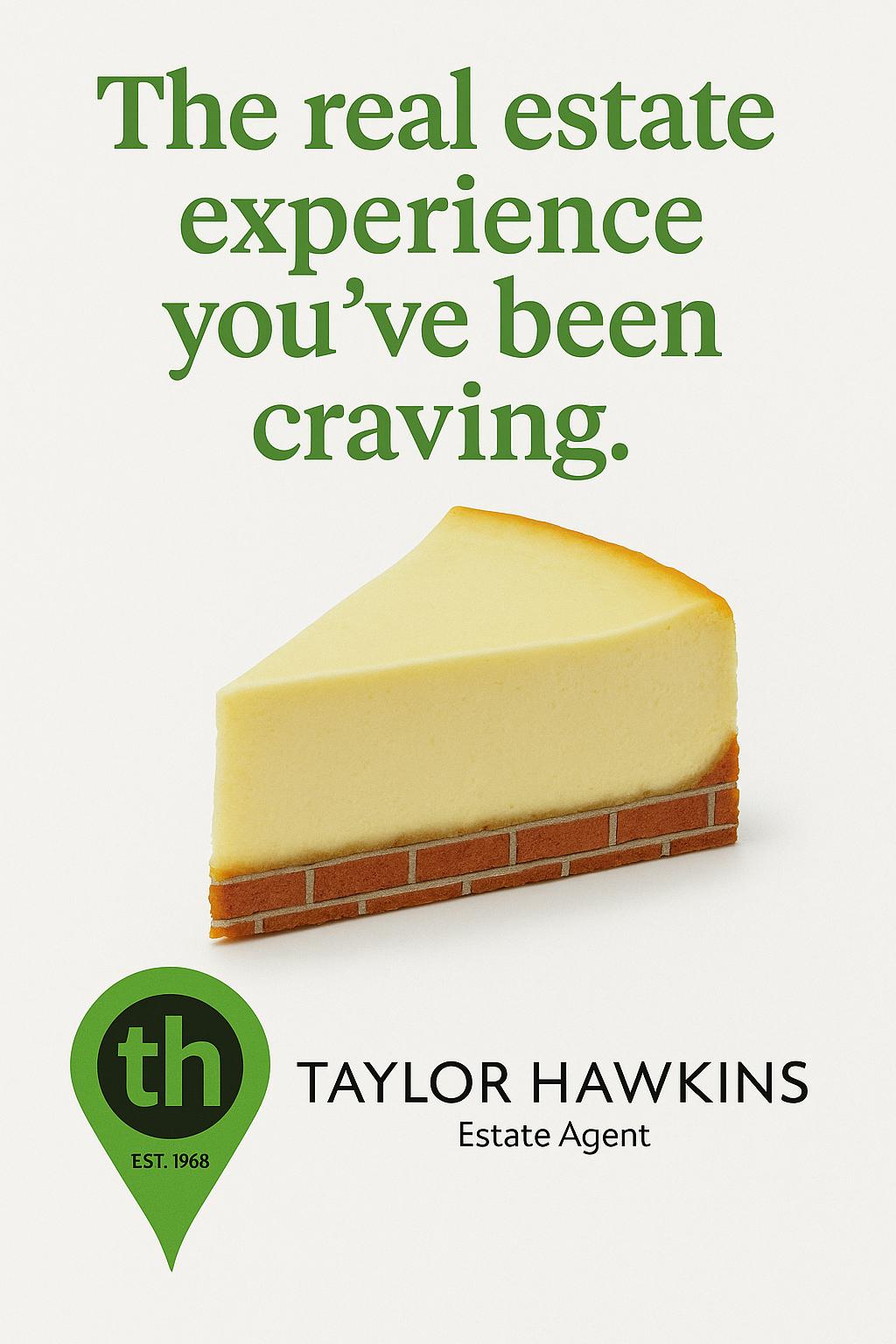


PARASHAT BAMIDBAR
SHABBAT: BEGINS ENDS
London 20:52 22:10
Manchester 21:10 22:40
Leeds 21:06 22:46
Liverpool 21:09 22:48
Birmingham 21:00 22:34
Antwerp 21:28 22:58
Bournemouth 20:51 22:19
Gateshead 21:13 23:00
Jerusalem 19:03 20:21







PARASHAT BAMIDBAR
SHABBAT: BEGINS ENDS
London 20:52 22:10
Manchester 21:10 22:40
Leeds 21:06 22:46
Liverpool 21:09 22:48
Birmingham 21:00 22:34
Antwerp 21:28 22:58
Bournemouth 20:51 22:19
Gateshead 21:13 23:00
Jerusalem 19:03 20:21



BY HARRY SIMONS
Families of hostages held in captivity by Hamas in Gaza held rallies across Israel to mark 600 days of captivity since the October 7 2023 terror attack yesterday.
Of 58 hostages still in Gaza it is thought 20 are still alive. There appears to be a breakthrough in talks according to latest reports last night for a ceasefire and release of those held captive.
Demonstrations included a human chain on the beach in Tel Aviv, and protesters who blocked major highways whilst the October Council presented a draft bill at the home of Knesset Speaker Amir Ohana in Tel Aviv. They were calling for the dissolution of the Knesset, elections and state commission of inquiry into the war.

distribute them,” he said. “I urge the international community to adamantly demand that this aid be distributed immediately to the people in Gaza.”
As for fighting global antisemitism, he observed it was the responsibility of all nations that values human dignity, liberty, justice, and tolerance.
President Isaac Herzog discussed the hostages’ plight at the International Holo caust Remembrance Alliance conference at the Ministry of Foreign Affairs in Jerusalem yesterday.

or arguments between colleagues or like-minded states as a weakness of Israel. When they see criticism, even from states like Canada, Australia, Britain or France, they sometimes immediately hail that
Herzog said being in Jerusalem for the conference was symbolic. He said: “Since October 7, antisemitism has come charging forward in cities around the world, on college campuses and online. It may sometimes masquerade as anti-Israel or anti-Zionist sentiment, but it is antisemitism. Nearly every day, there is news of assaults, threats and vandalism against Jews and Jewish institutions in Europe, North America, and beyond. As we stand at this crossroads, we must translate our sacred vow of ‘Never Again’ into action and use every























ADVERTORIAL
In a world full of economic uncertainty — from global tensions to rising interest rates and the ongoing cost of living crisis — there’s one shining opportunity that’s catching the eye of smart consumers everywhere: the soaring price of gold and silver.
With gold prices reaching unprecedented highs, even a small handful of old jewellery or silverware could now be worth thousands of pounds. That means now is the perfect time to rummage
through your drawers, cupboards, or safes and turn forgotten treasures into real cash.
But before you rush to the post office or visit a buyer, it’s essential to do your research. Make sure you know exactly what you’re sending or selling — the type of metal, its purity (for example, 18-carat vs. 9-carat gold), and its true value. Always ask local jewellers or pawnbrokers for a clear explanation of their pricing so you’re paid fairly for what you own.

At Simply Sold, we take the guesswork out of the process. We specialise in selling your gold, silver, and jewellery, working solely on your behalf to secure the best possible price. We offers a no-obligation home visits and expert appraisals — completely free of charge.
Why wait? Let Simply Sold help you unlock the hidden value in your home and put money back in your pocket today.
For more information, please email: perryfield@hotmail.com.






BY HARRY SIMONS
Shomrim NW London and British Transport Police have appealed for witnesses to a “racially motivated assault and robbery” against three Jewish boys at Hampstead Underground Station on Bank Holiday Monday.
The boys were threatened with a knife by up to seven suspects according to
Shomrin.
One of the boys was taken to hospital for observation.
Shomrim is supporting the victims.
“Enquiries are ongoing,” noted a spokesman.
Shomrim added: “Shomrim is supporting the victims and we encourage anyone who has been affected or who has experienced any form of antisemitism to get in touch. Shomrim specialises in reporting and supporting victims of antisemitic crime.”

Shomrim can be contacted on 0300 999 1234 quoting reference NW20926 May 2025. British Transport Police can be contacted by texting 61016 or telephone 0800 405040, quoting reference 596 of 26 May. Information can also be sent to Crimestoppers anonymously on 0800 555 111.

Continued from page 1
“History has taught us that when a fanatical regime calls for genocide against the Jews, it must be taken seriously. The antisemitic Iranian regime must never be allowed to develop nuclear weapons capability, its worldwide terror networks and proxies must be dismantled.”
Ministers, ambassadors, academics and community leaders from IHRA member countries attended.
Speaking at the Sderot Conference on Society and Education in Be’er Sheva on the eve of 600 days, Herzog said Israelis have “had enough”.
Herzog called on the State of Israel and its leadership to take every step to free the hostages.
“This is a critical moment in our history,” he implored. “This is the moment to initiate, to dare, to take step after step, to act in every possible way to bring them home, every last one of them.”
Herzog repeated his ongoing call for a state commission of inquiry.
“It is no secret that I have made a series of proposals aimed at creating dialogue and building broad trust and consensus that would enable the swift establishment of the commission,” he observed. “I call on all involved to sit down together, resolve the crisis and launch the investigation.”
Herzog added: “The people of Israel have simply had enough. (They are) fed up with the rotten culture of endless internal struggles, fed up with those who lead us into the depths of polarisation
and division, fed up with those who spend their days trampling over one another.”
Herzog concluded by saying that “slinging mud” at the IDF, spreading conspiracy theories about betrayal and calls for breaking the law even out of a patriotic concern was “under no circumstances” the way to a solution.
In related news, Israelis who receive compensation for terror acts from the Palestinian Authority will be deported.
Defense Minister Yisrael Katz instructed security bodies to transfer relevant information to Interior Minister Moshe Arbel for implementation at the Knesset meeting.
Katz stated: “I am leading a firm and clear policy. Supporters of terror who are citizens of the State of Israel will not receive any reward for their actions. Whoever chooses murder and hatred will be deported, their citizenship will be revoked, they will pay the full price. We will not allow terrorists to sit here comfortably, we will pursue them from home and abroad.”
Coalition whip Ofir Katz, who proposed the legislation in 2023, noted: “This is a historic event. There are no compromises in the war on terror.”
National Security Minister Itamar Ben Gvir added: “This is how we fight terrorism, not with words, but with deeds. Otzma Yehudit pushed forward the law to revoke citizenship. We will not stop until the next law we enact is the death penalty for terrorists. We do not negotiate with terrorists.”

BY HARRY SIMONS
Abu Wadei has begun a nine-month prison sentence after pleading guilty to attempting to enter the UK without leave or a valid entry clearance earlier this year.
Wadei, believed to be Mosab Al Qasas, was sentenced at Canterbury Crown Court.
Campaign Against Antisemitism welcomed the news and have called for the CPS to bring terrorism charges against him with charges relating to immigration breaches,.
“We believe that he has committed serious offences and that it is in the interests of national security to bring a
prosecution,” said a spokesman. “Failure to do so risks signalling that Britain is a safe haven for terrorists. For now, he is in prison, but we need clarity on what happens once he has served his term, will he be deported or will he be at liberty in Britain? Will he face justice for his potential involvement in terrorist activity abroad, or will he walk free? The general public and British Jews in particular must urgently be told the answers to these questions.”
Wadei was arrested following an investigation by CAA after his arrival in UK on a dinghy. He has found to be part of a Hamas-endorsed unit responsible for violence on the Gaza-Israel border.

Wadei reportedly told a rally in Gaza that he wanted to “die for the sake of Allah”.
CAA discovered a video posted to Facebook on September 18 2024 where he is heard praying for Allah to punish the Jews and those who ‘support’ and ‘conspire with them’ and ‘destroy them completely’.
CAA noted Wadei appeared to be living in Switzerland and Germany for two years, despite having hundreds of thousands of followers on social media accounts detailing his involvement in violence in Gaza. He crossed Europe to come to Britain. CAA have his WhatsApp number registered in Greece.
• Tax-efficient investing before and after Aliyah
• Tax-efficient income after 10-year tax-free period
• Receive your entire pension pot tax-free
• Specialist portfolio management for Olim
• No Inheritance Tax (for non-UK-situated assets)
We are seasoned experts in providing long-term financial planning advice for those making Aliyah. Scan the QR code to read more
With investing, your capital is at risk. Tax treatments are subject to individual circumstances and are subject to change.
BY ADAM MOSES
Israel’s tourism sector continues to show signs of recovery.
Some 15,000 visitors travelled between UK and Israel in April, mainly over Pesach. Data released last week, reveals year-on-year growth in visitors from the United Kingdom. Tourist entries from the UK peaked at 14,700 last month, a 133% increase on 6,300 visitors recorded in April 2024.
Although 37% below pre-conflict level highs in 2019 and 2023, the growth signals strengthens confidence in Israel as a holiday destination.
“This significant increase in UK visitors demonstrates the resilience of tourism to Israel and the enduring appeal of our country, particularly during festive periods”, said Michael Ben Baruch, UK Director of the Israel Ministry of Tourism. “We are encouraged by this upward trajectory as we continue to work toward recovery.” Wizz Air announced a resumption of full flight schedule to Israel earlier this month. Lufthansa Group resulted flights last week.
Wizz Air is significant for the UK market, as it offers affordable direct flights from British airports to Tel Aviv. UK travellers will welcome this improved connectivity.
Overall tourist entries to Israel hit 164,000 in April 2025, a 105% increase compared to April 2024, though 53% below April 2023 levels.
Based on current trends, Israel forecasts 1.4 million total tourist entries by the end of 2025.
The Israel Airports Authority notes additional carriers in the coming months. Airlines UK to Israel currently are EL AL, Israir and Wizz Air. British Airways and EasyJet are scheduled to resume flights in June but this could change due to the ongoing war.
Security Advice and updates is available on www.gov.uk. The most prominent change is travellers need at least 90 days on a passport from the date they enter Israel instead of six months.
Jerusalem is top of the list for many tourists. Israel’s largest city with a population of 1,046,300 according to the latest Central Bureau of Statistics, one in 10 Israelis is a resident of the capital.
Jews make up 57% of the city’s population, 38% are Arab. According to 2023 figures, 51% of Jewish residents are ultra-Orthodox.
In 2024, the city’s population grew by 17,900, mostly new births. The capital has a young population with 31.7% children up to 14 years of age, compared to 18.9% in Haifa and 18.2% in Tel Aviv.
Just 9.5% of residents in Jerusalem are 65 and older compared to 20.7% in Haifa and 15.6% in Tel Aviv.
There were 25,680 babies were born in Jerusalem last year, 66% to Jewish mothers, 34% to Arab women. Babies born in Jerusalem made up 14% of all newborns in Israel.








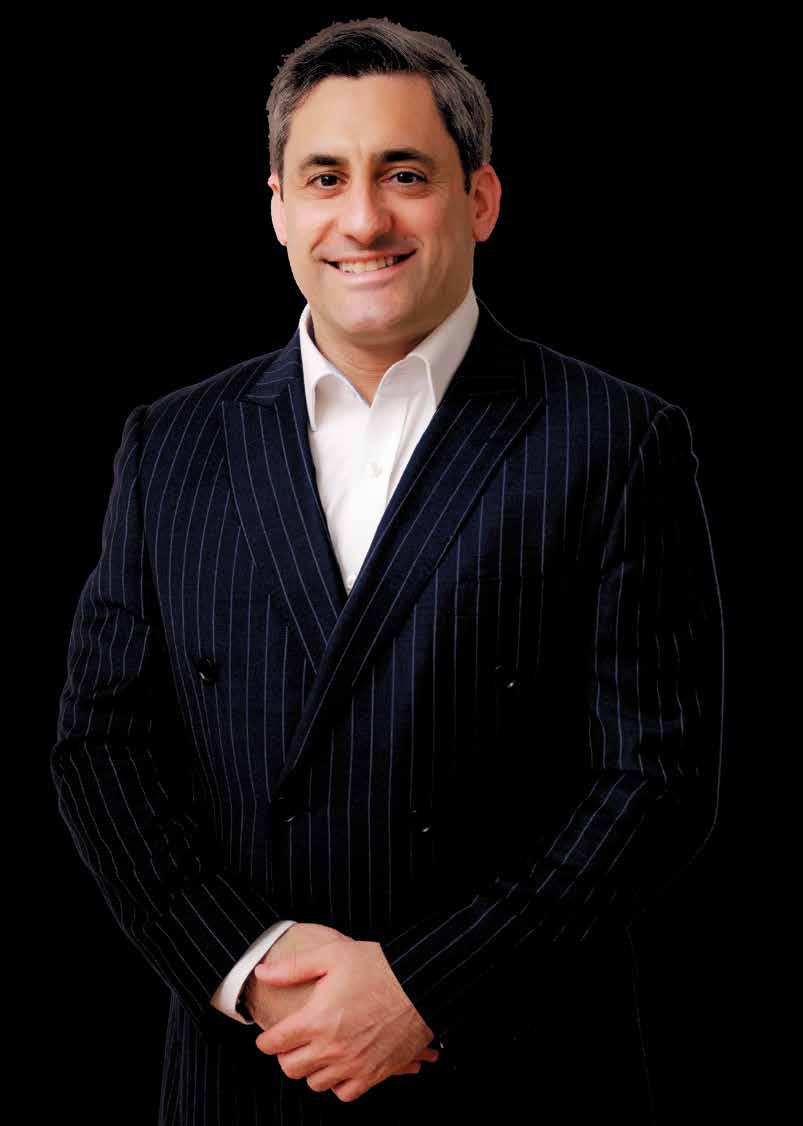




BY HARRY SIMONS
Dr Moshe Kantor has been elected president of the European Jewish Congress for a fifth term.
Delegates from over 40 countries unanimously backed the former EJC leader at the general assembly gathering in Jerusalem. Kantor, who led the organisation from 2007 to 2022, succeeds interim president Ariel Musicant who opposed his candidacy.
Kantor has vowed to fight antisemitism, cooperate with European institutions and governments, develop Holocaust projects and community security.
Cantor spoke about ongoing challenges following the October 7 2023, terror attack in his address.
“Every Jew in Europe knows that his or her destiny is absolutely tied to the destiny of the Jewish State,” he reportedly said. We feel it daily in our communities and our enemies know it too.”
Regarding European issues, Cantor added. “What we are witnessing is not only a threat to Jewish communities, it is a threat to the very foundations of European democracies. If left unchecked, this growing hatred will erode the social fabric of our societies. We are already seeing increased polarisations as the extremes gain strength and moderation is pushed aside.”
Kantor paid tribute to Muzicant for his leadership in recent difficult years and vowed to work together for the benefit of all communities.
Regarding Israel, he observed: “This is a time for unity, not division. In times of crisis, we must act responsibly. We will never criticise Israel in international media. We may have concerns, like any true
friend. But we express them respectfully, privately and always with care.”
Kantor called for unity amongst European Jews, observing: “We must work together at all times, supporting communities, respecting their autonomy and consulting on all issues.”
In other EJC news, a groundbreaking series of short cartoons created by the EJC entitled ‘Glad You Asked’ has reached millions in recent months.
The series of online educational videos explaining Jewish life and culture was part of an EU-funded project. The initiative raises awareness of challenges faced by Jewish communities in Europe.
Videos have been accessed on Instagram, X, Tik Tok, Facebook, YouTube and LinkedIn.
Topics include Shabbat and Jewish festivals, antisemitism, the Holocaust and Jewish history, Jewish life-cycle events, Israel and Jewish contribution to Europe.
The final episode published this month about Israel explores the diversity and resilience of the Jewish state as a global leader in innovation, science, agriculture and technology.
The cartoons feature three young people asking and answering questions using animated settings in European cities, Jewish homes, synagogues and other locations.
EJC Executive Vice President Raya Kalenova welcomed the response.
“People have accessed these cartoons on social media, commented positively on them and interacted with them,” Kalenova said. “It’s been a great success in the sense that we have opened up education about Jewish life in Europe and about the day-to-day lives of our communities to a new, younger audience.”
British Jewish Culture month kicks off in 2026.
Highlighting famous Jewish people and their contribution to British life the event, which runs from May 16 to June14, feature comedy, food, music and literature. The initiative gives a platform to Jewish
cultural institutions and encourages wider British cultural institutions, public bodies and schools to celebrate British Jews. Local Jewish centres, including synagogues, schools, and charities will be encouraged to open their doors to visits from local schools and other groups.
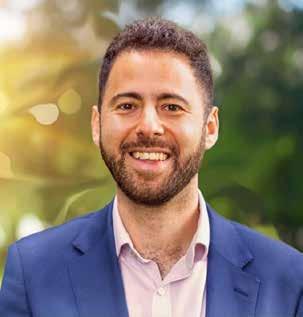
“That is a positive for a diverse yet united Europe and a key component in fighting ignorance and antisemitism,” she added.
The campaign is part of the ‘BADRI: Bringing Awareness, Dialogue, and Resilience Improvement’ project, funded by the European Union through the CERV programme.
Kalenova said. “It has spread knowledge and broken-down stereotypes. That’s good for us, but I see it also as a major contribution to the betterment of European society too,” she said.

Meantime, the Coordinating Committee of Belgian Jewish Organisations (CCOJB) and Forum of Jewish Organisations (FJO) have condemned police raids on the homes of mohels in Antwerp.
A statement noted: “This intervention represents a troubling infringement on freedom of religion and has sparked strong indignation and profound unease within our community.
“Circumcision is a fundamental religious practice, legal and respected for centuries, both in Belgium and around
the world. That it can now lead to disproportionate police measures is a painful reminder of darker times when Jewish traditions were under pressure. The media coverage of these events has further led to the stigmatisation and public humiliation of the Jewish community.
“Such actions fuel antisemitic sentiment and undermine trust in the rule of law. We call for strict respect for religious freedom and for measures to be taken to ensure that such a precedent cannot be repeated.”
Board of Deputies President Phil Rosenberg, who launched the event, said: “This will be a major change for the UK Jewish community. A strategic rebrand, which proclaims: ‘less oy’, and ‘more joy’.
“It cannot be right that the only public commemoration of Jewish life is Holocaust Memorial Day and the only compulsory education about Jews is Holocaust education. Both of these are crucially important but we do not want the British public to know only of Jewish death and Jewish pain. We want them to know about Jewish life and Jewish joy.”
Details: jewishculturemonth. org.uk
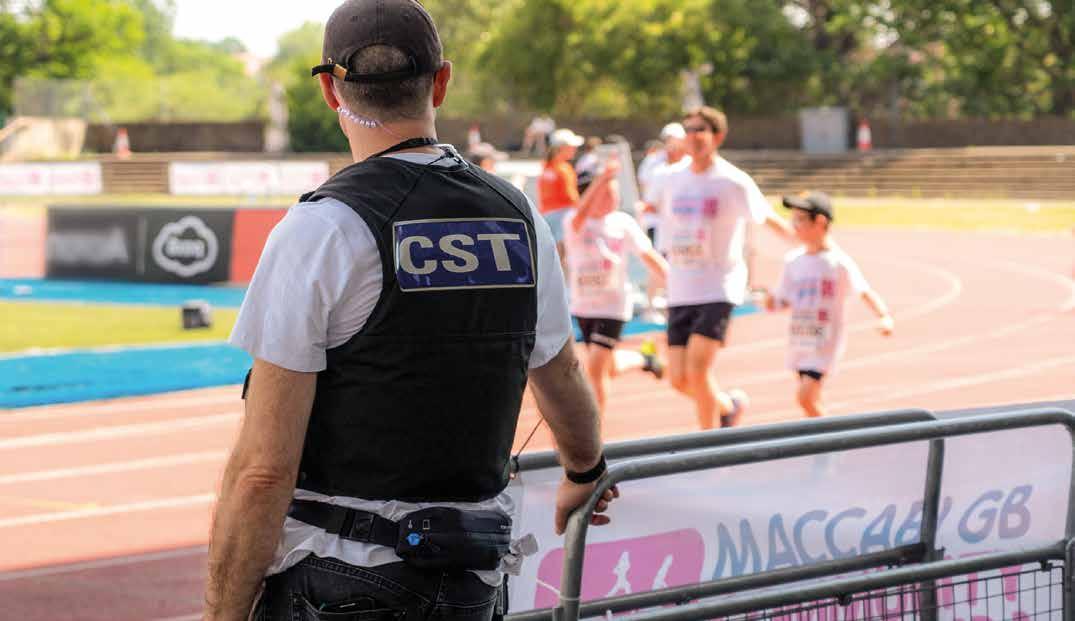
Protecting and securing the Jewish community in the UK against antisemitism is what we do. CST will leave no stone unturned in the fight against those who wish to do us harm.
We need your ongoing and long-term support to continue our work.
BY DAVID SAFFER
Bestselling author Rabbi Levi Y. Shmotkin concludes a global book tour about mental health in Belgravia, London over Shabbat.
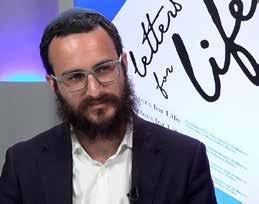
cities
on emotional wellness
at synagogues, conferences, college campuses and Jewish community centers since releasing Letters for Life: Guidance for Emotional Wellness from the Lubavitcher Rebbe in July 2024.
This week Smotrich spoke to communities in Paris, Bournemouth, Florence and Rome. Earlier this month he visited Copenhagen, Malmo, Brussels, Belgium, Helsinki and Finland.
Drawing on four decades of letters and private counselling of Rabbi Menachem M. Schneerson, Shmotkin has provided anecdotes and tools for finding emotional equilibrium in the modern world.
“Our generation is known as the ‘anxious generation’ and this book shares invaluable teachings for so many who are struggling emotionally,” said Shmotkin.
“The Rebbe’s practical insights and guidance can help countless people, young and old, who are dealing with stress, anxiety, low self worth and much more.”
Released in July 2024, ‘Letters for Life’ has resulted in social media
communities, online courses, book clubs and self-guided workbooks based the publications’ teachings.
The Rebbe was a visionary leader who launched global initiatives to rebuild Jewish life after the Holocaust, ‘Letters for Life’ offers another dimension to his legacy.
With unprecedented access to the Rebbe’s correspondence, Shmotkin analysed tens of thousands of letters to people from all walks of life facing emotional and spiritual challenges.
“The Rebbe had the remarkable ability to distill over 3,000 years of Jewish wisdom into simple, practical advice that resonates just as strongly with readers today as it did with those to whom the advice was given initially,’ noted Shmotkin.
Shmotkin discovered the Rebbe’s letters during his own struggles as a young adult.
“As I read the Rebbe’s letters searching for answers, the words had a vibrancy and a life to them, as if they were
speaking directly to me.” Shmotkin recalled. “The advice spoke to the very experiences I was having, the fears, the angst, the isolation. I gradually began feeling an energy lifting me out of a dark place and revealing a profound lightness I didn’t know existed.”
Discussions explored the two sections of ‘Letters for Life’.
‘Essentials for a Healthy Life’ focuses on preventative emotional care. ‘Overcoming Darkness’ addresses practical approaches to handling anxiety, selfdoubt, sadness and low self-esteem.
Based in Brooklyn, Shmotkin has developed courses exploring the Rebbe’s teachings studied by tens of thousands of pupils worldwide.
Letters for Life: Guidance for Emotional Wellness from the Lubavitcher Rebbe by Levi Y. Shmotkin (Ezra Press and Chabad.org) is being translated into Spanish, Russian, Portuguese and German.
Hasmonean Primary School on Wednesday welcomed the Minister for School Standards, Catherine McKinnell, and leaders from Barnet Education Service, who came to observe a new
educational initiative.
Hasmonean has been instrumental in introducing the ELSEC programme to its Nursery and Reception classes. This scheme helps schools, nurseries and

parents to support their children with speech, language and communication needs (SLCN). The focus is on supporting those children who have mild to moderate SLCN and who do not meet the threshold for specialist support. Hasmonean staff have had bespoke individualised training and the positive impact of this programme has been seen across Nursery and Reception, so much so that it is now being brought to Hasmonean’s innovative Learning Space as well as Key Stage 1.

Head of Early Years and SEN Support at Hasmonean Primary School, Jemma Brahams, said: “The impact on our pupils’ development has been really positive. The training provided on these interventions has been huge for us, as we now don’t need to wait for anyone to come into the school or go on any waiting lists – we can just take it forward straightaway.”
The Minister came because the school has been part of the Earlier Support
for Speech and Language programme (ELSEC) since January. She observed a small group intervention in one of the school’s calming environments. The activity focused on developing children’s social communication skills by engaging the children’s attention, promoting interaction and vocabulary, and making learning and communication fun.
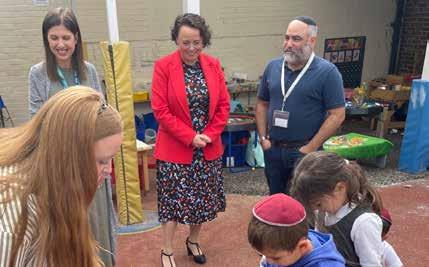
BY DAVID SAFFER
Rabbi Sholom Ber Lipskar, who passed away earlier this month aged 78, rejuvenated Jewish life for visitors and residents of Miami.
Spiritual leader of Bal Harbor for over four decades, he also founded the Aleph Institute, impacting the armed forces and penal system.
Rabbi Lipskar played a leading pastoral role when 98 people died in the 12-story condominium collapse in Surfside when Tropical Storm Elsa struck Florida in 2021.
The Chabad emissary was laid to rest at the Old Montefiore Cemetery in Queens, New York.
U.S. Senator Rick Scott, who flew in from Washington DC led heartfelt tributes, stating: “My own life is immeasurably better for having known and learned with him.”
“We were honoured to call him a friend,” he added. “He was a guiding light during the Surfside tragedy and will always be remembered for his kind spirit.”
Rabbi Aaron Lipskar, executive director of Aleph Institute, General Consul of Israel Maor Elbaz Starinsky and Rabbi Shneur Z. Oirechman, Panhandle Chabad accompanied Scott to offer condolences to the Lipskar family.
Former Bal Harbour mayor Gabe
Groisman said about Rabbi Lipskar in 2021: “He’s always 100% invested in the person that’s in front of him.”
Lipskar was born to Rabbi Eliyahu Akiva and Rochel Lipskar in the Soviet Union, 20 days before his family’s escape from the Iron Curtain. After a number of years in DP camps, the family immigrated to Canada where Rabbi Eliyahu Akiva became an educator.
Sholom Ber was sent to New York to study at the Central Lubavitcher Yeshivah, and in 1969, following his marriage to Chani Minkowicz and a year of study, arrived in Maimi, under the guidance of the Rebbe, Rabbi Menachem M. Schneerson to build a Jewish infrastructure.
The Rebbe told them: “I’m traveling with you! You should go with joy.”
Taking the helm at a new Chabad day school founded by Rabbi Avrohom Korf, after a decade in education, and with the Rebbe’s encouragement, the couple founded a synagogue in Bal Harbour. Initially not welcomed by the Jewish community, they built up a congregation and lifestyle that has become a template for Chabad centers.
The Rebbe described it as a place where visitors across the globe would draw inspiration and 20 years later it had been expanded by a $20m renovation.
Chabad noted: ‘He was an architect of souls, who has directly brought tens
of thousands of individuals and families closer to Judaism. The sheer range of his mentees is astonishing, ranging from wealthy Floridians to down-and-out street people. To him it made no difference. He saw the soul and did what he could to make each one shine that much brighter through exposure to Torah and unfiltered love.’
Encouraged by the Rebbe, Rabbi Lipskar founded The Aleph Institute, which became his greatest achievement.
The Institute is dedicated to assisting and caring for the wellbeing of U.S. military personnel, prisoners and people institutionalised or at risk of incarceration due to mental illness or addictions.
In 1985, Rabbi Lipskar got permission from the Bureau of Prisons to take 20 prisoners from 12 federal facilities to participate in a mentorship program in New York led by Aleph.
The men joined the Rebbe’s farbrengen at his synagogue un Brooklyn one Shabbat. Rabbi Lipskar arranged for them to sit together until the Rebbe intervened.
The Rebbe, Chabad recalled, said that the prisoners did not look like Chassidim, which might cause the embarrassment. The Rebbe insisted they should be ‘spread about the room’.
“There was almost never a time when I passed by the Rebbe for dollars that he didn’t mention Aleph,” Rabbi Lipskar told
Chabad in 2019, noting he would send the Rebbe regular reports on the organisation’s activities.
“He would give me a dollar especially for Aleph and say, in Yiddish, ‘For the entire Aleph,’ or ‘Aleph guides all the letters that follow,’ or something of that nature,’” recalled Rabbi Lipskar.
Aleph was expanded to serve people in the armed forces with kosher food, resources, support and care.
He is survived by his wife Chani, his children, Devorah Leah Andrusier and Zalman Lipskar, grandchildren, and siblings Rabbi Mendel Lipskar, director of Chabad-Lubavitch of South Africa, Batsheva Schochet and Yossi Lipskar.
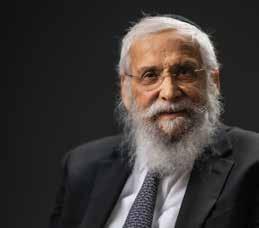
For the first time in the UK, hostage survivor Omer Shem Tov, kidnapped from the Nova Festival and held by Hamas for 505 days, will share his powerful story live.
Join JNF UK for an exclusive screening of “Home: Omer Shem Tov Speaks”, the gripping new documentary by acclaimed Israeli director Yoram Zak, followed by a deeply personal interview and Q&A with Omer and Yoram.
Thursday 26th June
North West London Venue
Doors open: 6:45PM | Screening starts promptly at: 7:30PM

Profits from the event will support Nova Festival survivors
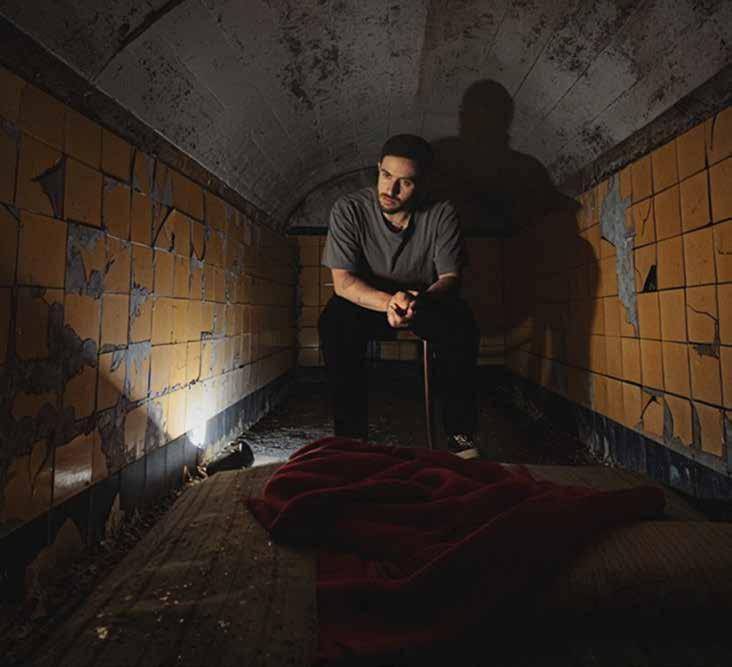





BY HARVEY BRATT
A Will is an important document. First it sets out how you want your estate to be divided when you die. Second, your will remains valid until it is changed. So even if your circumstances have changed and many years have passed, that outdated will still governs the distribution of your estate when you die.
So it’s important that a will is drawn up by a professional who understands all the ramifications. Your solicitor needs an understanding both of the law of will-making to ensure that it meets all the necessary formalities, and the law of succession so that you can be properly advised about those who you want to include (and exclude) from your bounty
And it’s also important that you keep your will under review and make changes - large or small - when family circumstances change (eg adding a new child/ grandchild or removing someone who has died before you), changed financial circumstances (eg your estate has increased or decreased in value) or changes to the law, especially to Inheritance Tax rules.
The Wills Act 1837 has been with us for 188 years. It has become a ‘friend’ to the legal profession for its brevity and
simplicity. It has stood the test of time and remains the ‘bible’ for how a will must be executed to be valid. Section 9 of the Act requires that a will must be in writing, signed by the testator and witnessed in writing by two witnesses who are present in person at the same time.
But this is all likely to change.
The Law Commission recently published its proposals for reform. These have Government support. The proposals address a number of matters but in relation specifically to the subject of the validity of wills there are two important changes:

First, even if the technical requirements of s.9 of the Wills Act are not met, a court will be able to dispense with those
requirements and declare the will valid. Whilst this may appear to address the Commission’s intention of upholding testamentary wishes, I see dangers ahead. The technical provisions are not so onerous and are there for a purpose – clarity of intention. How can a court be sure that, say, an unsigned and unwitnessed document genuinely reflects the testator’s last wishes and declare it to be formally valid, overriding the provisions of the legislation?
The second major change will be to allow digital wills. These have become commonplace in other jurisdictions, and, for a brief period, were permitted here during Covid-19. Whilst digital wills do address the burden of having a testator and their
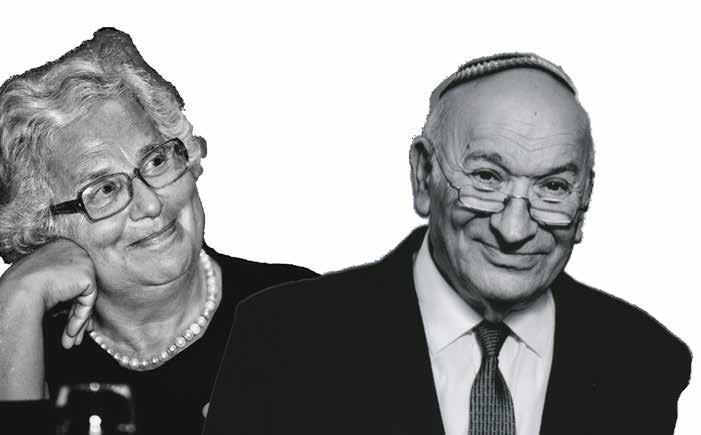
“I wanted my grandchildren to understand the values that have guided our family. The final result was nothing short of a masterpiece.”
witnesses in the same room at the same time, I am concerned that they will be open to abuse and imperfection, especially with older testators who are not comfortable in a digital environment.
We will have to see how these as the legislation passes through Parliament. Watch this space!
For more information contact Harvey Bratt, solicitor and UJIA Director of Planned Giving on 020 7424 6431 or harvey.bratt@ujia.org







A life’s story is more than just a collection of events and memories. It encompasses identity, values and beliefs.
It encompasses values, beliefs and heritage. At Legacy Live, we believe every story deserves to be captured and preserved as a precious keepsake for future generations.
Our cinematic documentaries are expertly created by experienced former BBC television professionals and journalists, who understand the power of a life story and of passing on cherished lessons and values.
“Without exception, all the family found it deeply emotional to watch. They also learned many things they hadn’t known before. My granddaughter, aged 9, even asked to watch it again!”

A group of aspiring young Jewish leaders from the UK were honoured with a special audience with Israeli President Isaac Herzog at his official residence this week as part of the Yehudi Programme’s annual Yom Yerushalayim Leadership Trip. The meeting formed a memorable and meaningful highlight in a five-day journey aimed at strengthening Jewish identity and nurturing future communal leadership.
The Yehudi Programme, an initiative of Mizrachi UK, brought 20 Year 12 students from London and Manchester together for this powerful experience. They were accompanied by seven university-aged mentors - all former graduates of the programme now participating in an advanced leadership track.
Over the course of the trip, the group engaged in a wide range of experiences designed to deepen their connection to Torah, Israel, and Jewish peoplehood. Highlights included a morning of Torah learning in the Old City of Jerusalem, an extremely informative workshop at the Stand With Us Headquarters about the history of the Arab-Israeli conflict, a hands-on Chesed (social action) initiative, and meetings with current and former Members of Knesset at the Israeli Parliament. One of the most emotional moments came when Rav Doron Perez; Executive Chairman of World Mizrachi addressed the group at the graveside of his son, Daniel Perez- a profoundly moving and personal reflection on leadership
and sacrifice.
The delegation also participated in uplifting Yom Yerushalayim celebrations including a special festive service at Yeshivat HaKotel and a Shacharit service with tens of thousands at the Kotel the following morning before joining thousands in dancing at the Kotel in the afternoon. But it was their visit to the official residence of President Herzog that provided a uniquely personal and historic moment.
During their meeting, President Herzog asked the students directly about the challenges of antisemitism on UK university campuses. He listened attentively to their experiences and praised the participants for their courage and commitment in stepping forward to lead. He acknowledged the importance of their efforts to build strong Jewish communities in the UK and beyond.
Aryeh Richman, Executive Director of the Yehudi Programme said:
“This truly unique trip was a powerful expression of everything Yehudi stands for. Meeting President Herzog and hearing his encouragement reinforced for our participants just how vital their voices and leadership are and watching our group lead singing and dancing throughout the trip; bringing other groups into their circles, was nothing short of inspirational. We returned to the UK not only uplifted by the most incredible celebrations for Yom Yerushalayim, but also with a renewed sense of purpose: to identify
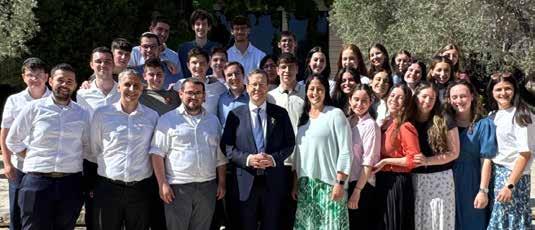
what our unique contributions to the Jewish people might be, and to commit fully to developing our craft as leaders.”
Daniel Lyons, a first year student at Leeds University and one of the mentors on the Yehudi programme said:
“The trip has reignited the spark in me to give back to Am Yisrael and share my love for Torah and Israel”
Sofia Hakimian, a first year student at Kings College University and one of the mentors on the Yehudi programme said:
“The trip made us feel even more like a part of Am Yisrael’s eternal story. It was a trip where friends became family and memories were created that we will carry forever.”

This leadership journey is a central feature of the Yehudi Programme’s wider mission: to identify, inspire, develop and nurture the future leaders of the Jewish people. Participants return to the UK
empowered, energised, and committed to carrying forward the values and vision they have absorbed in Israel.
Dani Cooperman, a first year student at City University and a Mentor on the Yehudi programme said:
“This trip was not only packed with fun, but also incredibly inspiring and moving for everyone. I’ve never felt more connected to Israel and to the people around me.”
Eden Davis, a Year 12 student at Hasmonean Girls School and a Madricha on the Yehudi programme said: “The Yom Yerushalayim Yehudi trip was truly unforgettable—it brought me closer to so many people and gave me a powerful, personal connection to Israel that I’d never experienced before.”
For more information about the Yehudi Programme, contact: uk@mizrachi.org






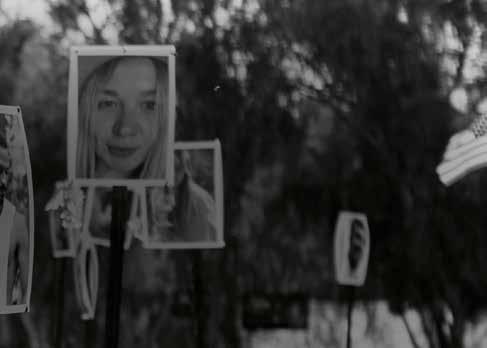












The London School of Jewish Studies (LSJS) held its annual conference, and a wraparound programme for participants to visit schools, for secondary school Jewish studies teachers and informal educators, on Wednesday 21 May, with 80 participants including those from Turkey, Netherlands, Romania and Israel. It’s next annual conference for primary school teachers is on 20 January 2026.

LSJS President Chief Rabbi Mirvis introduced the day. He said, ”we learn from Mishlei, that, as when digging for treasure, a person’s search for Torah education needs to be accurate and persistent.”
The conference included sessions on Israel Education in Tough Times, Using GenAI in Schools and Behaviour is Communication: Understanding & Responding.
Participants also had the option to take part in a session on Preparing our Students for Life on
Campus Post Oct 7.
“Teachers too rarely get the opportunity to be students, said Dr Helena Miller, Director of Degrees and Teacher Training, Senior Research Fellow.

”Today at LSJS, teachers from across our Jewish schools learnt from experts in their fields and also had the chance to learn from, and with, each other”.
Jonathan Levy, head teacher of Tanenbaum- CHAT Community Jewish High school in Toronto gave the keynote address, in which he spoke about the school he leads.
“Our teachers’ conferences are highlights of the academic year, and

educators from all over Europe look forward to sharing and networking,” said LSJS Chief Executive Joanne Greenaway. “It is a great opportunity for them to share strategies on how they engage and motivate their students and talk about the challenges they face and how they approach them.”
The conference was kindly sponsored by UnitEd.


#NorwoodChallenges

Join us on the wild side for this exciting 5-day cycle from Nairobi across the plains of Kenya, through the Tsavo National Safari Park and on to the beaches of Mombasa. Hybrid bikes, a mix of dirt and tarmac roads and the chance to see the Big Five, this is a feast for the senses not to be missed.
We’ll support you all the way and together we can support and empower neurodiverse children, their families and people with neurodevelopmental disabilities, to live their best lives.
More information: challenges@norwood.org.uk
To book: norwood.org.uk/challenges/kenya

BY REBBETZEN ELISHEVA NEWMAN
It’s that time of year again. Classrooms are eerily quiet, library seats are suddenly in short supply, and the familiar hum of student life has been replaced by highlighters, caffeine, and a nervous buzz of revision. Whether in secondary schools or at university, Jewish students across the UK are sitting crucial exams - and with them, facing the pressure to succeed.
But what does “success” really mean? And more importantly, how should we, as Jews, define it?
Our society often presents a narrow picture: success is about being the best. Top grades, prestigious universities, high salaries, public accolades. We measure ourselves by others’ achievements, and in doing so, we often forget that our true accomplishment lies not in where we’ve got to, but in how far we’ve come. Judaism flips the whole system. Our
sages teach that Hashem doesn’t compare me to anyone else - He only compares me to me. Am I moving forward? Am I growing? Am I becoming a more refined, G-dly version of who I was yesterday?
This shift in perspective is empowering and deeply personal. It means that your success might not look like someone else’s. In fact, it shouldn’t. Because your struggles, your character traits, your circumstances and inner battles are yours alone. And it’s precisely those inner conflicts—between selfishness and generosity, laziness and effort, physical temptation and spiritual aspiration—that define your path to greatness.
Rav Dessler, one of the great thinkers of the last century, writes that our true “battlefront” lies in the place of struggle. If something is easy for you, there’s little growth in doing it. But when I choose to get up and daven even though I’m tired, when I choose to help a friend revise even though I need to study myself, when I choose to say no to something physical because I want to say yes to something
spiritual - that’s success.
And crucially, only Hashem knows the full picture. Only He sees the struggle behind the scenes. Society might see someone as “average” or “underperforming,” but Hashem may see a spiritual giant. The Mishna in Avos teaches us, ןּבֶּ
- lefum tza’ara agra - according to the effort is the reward. Not according to the result. G-d looks at the climb, not just the summit.
So, if you’re the student who’s worked tirelessly to push a C to a B - don’t for a second think you’re less successful than the student who’s breezed their way to an A*. If you’re battling anxiety, distraction, or the challenges of faith, and you’re still trying, you’re winning. Because your success isn’t about being the best in the room—it’s about being the best you. Of course, we live in the world and we must ride its waves. Exam results matter. Job interviews matter. We should aim high and work hard. But in this season of exam stress and self-doubt let’s hold on to the deeper truth: our success is not determined by numbers or accolades. It’s
determined by how much we grow, how much we strive for choosing soul over self, and how much we become the best versions of ourselves.
And that’s something no exam board can ever measure.
Elisheva holds a BSc in Mathematics and has a QTS teaching qualification. She was an inspiring and much-loved teacher at Mathilda Marks Kennedy Primary School for nine years. Passionate about people and Judaism, Elisheva has held various educational and social director roles including spending two years in Bristol with Aish on Campus opening her home to Jewish students. Elisheva, together with her husband, are the UK FJL Educators. Her role includes learning with and maintaining strong connections with Alumni – the leaders of tomorrow! For interest in the FJL summer programme contact info@jewish-leadership.com
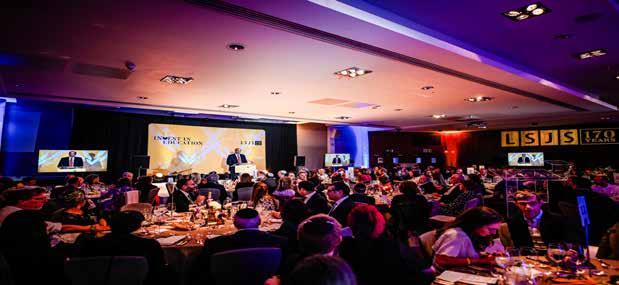
LSJS (The London School of Jewish Studies) held their Invest in Education gala dinner on Wednesday 14 May to
celebrate Gary Phillips, LSJS’ Chairman from 2018 until 2023, and his outstanding contribution to
Jewish Education.
180 people attended the dinner at St John’s Wood Synagogue which will be followed by a matching campaign launched next month.
There was a presentation on Eight Transformative Moments in Jewish Education featuring educators including S&P Sephardi Senior Rabbi Joseph Dweck, LSJS Deputy President, Rabbi Dr Raphael Zarum, Dean of LSJS and holder of the Rabbi Sacks Chair in Modern Jewish Thought and Gila Sacks, The Rabbi Sacks Legacy and LSJS Susi Bradfield Women Educators’ Programme graduate.
The readings demonstrated how as a people we have always turned to Jewish education and learning over the course of history when faced with profoundly challenging moments and how they have enabled our tradition to endure, flourish and survive.
“Educating our children in the richness of our tradition takes skill, care and concern,” said Bill Benjamin, LSJS Chair. “At LSJS, we aim to ensure that our young people are taught by the best teachers the community can offer.”
“We are so thrilled to have hosted such a special event and are exceptionally grateful to all our generous donors who have played such an important part in ensuring that our community has the education it needs in order to continue to thrive,” said Joanne Greenaway, Chief Executive of LSJS.

A father and son from Hendon have launched a new community initiative that’s already helping hundreds of seforim find new homes — providing a meaningful, respectful and practical way to share Torah learning, save money, and reduce waste.
Martin and Rafael Kander, from northwest London, created SeferSwap.com, a free online platform where people can give away or receive seforim they no longer need. Whether someone is moving house, clearing shelves, or dealing with a relative’s library, the site makes it easy to pass on valuable Jewish books to others who will use and appreciate them.
The idea came about when Martin noticed that local sheimos bins were filling up faster than they could be emptied — often with seforim still in perfectly usable condition. “We realised that instead of burying good sefarim, many could go on to benefit others,” he said. “There are people actively looking for certain books, but either can’t afford them or can’t find the exact edition. This is a way to connect people and keep Torah learning moving forward.”
The website, which launched in late 2024 and is approved by local Rabbanim, has already seen over 200 books given away. SeferSwap.com offers more than 50 categories — from halachah and
chumash commentaries to parenting, history, and Jewish thought. Users simply register, list the books they’d like to give away or search for ones they need, and use the built-in chat to arrange collection or delivery.
Rafael, a Year 11 student at Hasmonean Boys’ School who is currently taking his gcse’s, built the site himself after teaching himself coding and receiving mentorship from his engineering coach and mentor, Mr Sami Birnbaum who has been advising Rafael along the way.
Rafael also added that many of his classmates use the site when they’re looking for seforim for school or personal study. “Sometimes people don’t have a spare copy of what they need. Now they can find it for free.”
Martin noted that while digital editions are increasingly available, many people still prefer a physical sefer, particularly for Shabbos and Yom Tov. “It’s not the same as having a real book in your hands — being able to take notes, highlight a section, or build a personal connection over time.”
One user found a hard-to-find English edition of Kuzari he had been searching for for years. Another had started learning with a new chavrusa and needed a specific volume, which he found through SeferSwap.com — giving the book a
second life and helping keep the learning going.
Martin added that these days, bar mitzvah boys often receive fewer books than they used to, and that many people cycle through different stages of learning. “A sefer that isn’t being used anymore can still be the perfect match for someone else. We’re just helping those connections happen.”
While the site is completely free, the community is invited to make voluntary donations to help cover the costs of hosting and maintaining it.
“Our goal is simple,” Martin said. “To make sure seforim continue to be used, learned from, and appreciated. Every book that finds a new home helps build the next chapter of someone’s Torah journey.”

We like to believe that, as a community, we look after our own. That when someone is in distress, help will be there. But the truth is, for many families facing crisis be it divorce, mental health struggles, legal entanglements, or safeguarding concerns—there’s no clear path to follow. And too often, no obvious place to turn. The challenges come quietly. They appear behind closed doors. A child excluded from school. A parent overwhelmed by mental health needs. A knock at the door from social services. Not all crisis looks the same, but it leaves the same trail: fear and the sense of being completely alone in the face of complex systems and overwhelming decisions.
And yet, amidst all this, something quietly extraordinary exists in our community. A place that doesn’t make headlines, but quietly holds families together when everything else seems to fall apart. A place that understands that trauma doesn’t end when the emergency passes it lingers and without support, it festers.

The Jewish Family Centre is
not a headline-grabbing institution. It doesn’t rely on glossy campaigns or loud declarations. But it is, for many, the most important phone call they ever make. Over the years, it has quietly helped hundreds of families across the community, not defined by their level of observance or background, but by their need to be heard, supported, and guided through some of life’s hardest chapters.
In moments of crisis, it’s rarely the event itself that causes the greatest pain.
Miriam Coleman, Manager of the Family Support Service at the Jewish Family Centre (JFC), put it best:
Centre steps in where others step back, offering everything from therapy to court advocacy to emotional guidance. If you’re in crisis, they are here for you.
For those who discover it, there is a common feeling: “I didn’t know something like this existed. I didn’t realise there was a place that would understand.”

“What breaks families isn’t just the crisis—it’s what follows. The trauma. The waiting. The endless bureaucracy. The isolation. We are here to carry families through the aftermath.”
The Jewish Family Centre provides professional, compassionate support for families facing serious challenges and family breakdown, mental health concerns, child safeguarding issues, or complex legal and welfare processes. The
At the heart of its work is the Child Contact Centre, recently awarded enhanced accreditation by the National Association of Child Contact Centres (NACCC). This safe, neutral space is where children can
meet non-resident parents in a structured, supportive setting. With dedicated rooms for young children and teens, supervised visits, and a warm, welcoming atmosphere, this centre helps preserve crucial family bonds during the most fragile moments.
But for many, JFC becomes more than a service—it becomes an extension of their family. Especially for single mothers or overwhelmed parents with nowhere else to turn, the Centre is a place of such valued support. One mother shared that
when she walked into JFC for the first time, it was the first time she felt truly seen, truly heard and no longer alone. The Centre provides vital, professional social services for families facing serious challenges. These include:
• Navigating police & social services
• Liaising with schools & education providers
• Accessing CAMHS for mental health assessments
• Working with the Bet Din & Rabbinate
• Supporting families through the court system
• Operating a supervised contact centre
• Coordinating with welfare support organisations
• Providing therapy and long-term professional care.
In a world where it’s easy to feel invisible, JFC reminds us that no one has to suffer in silence and they help carry the load. Support this vital work by donating: https://www.charityextra.com/jfc and to find out more or be in touch for support: www.jewishfamilycentre.org.uk / 0208 209 1117
BY ROXANNE STROSS
I’ve always been taught that if you’ve got a bit of time and a bit of heart, you’ve got something to give.
When I was a kid, my mum used to take me around care homes. I wasn’t too thrilled at the time, if I’m honest. But she’d bring nail polish, we’d chat to the residents, paint nails, have a laugh, and without realising it, I learned something that’s stuck with me ever since: people, especially older people, just need a bit of time, a bit of care and someone who sees them.
Fast forward to high school. I saw an elderly woman in a wheelchair struggling with her shopping. I offered to help, took her bags inside, and said, “Fancy a cuppa?” She told me she only ever had tea when her carer came at 11am, and that it was the highlight of her day. It broke my heart, especially as I’m a proper tea lover myself.
After that, I started a rota with my friends and we’d take turns popping in during breaks to make her cups of tea. One thing led to another, I realised what my calling was, and that small act turned into a day centre I ran in Manchester for 17 years through Chabad Community
Care. Eight years ago, I moved to London and joined GIFT, and I’ve been keen to replicate this ever since.
Since being at GIFT, I’ve had lots of different roles, but my absolute favourite part is working with the volunteers and recipients who honestly feel like family.
And now, I’m so excited that on 26 June, we’re launching something really close to my heart: Cuppa Kindness.
This is a social club with a difference. A chance for those who need company to connect with those who want to give company. A chance to feel at home. To connect. To be seen.
and walk out feeling like they gave. And some might come to help, and walk out realising they were the ones who needed it too.
That’s exactly how it should be. Rabbi Dessler teaches that even receiving is part of giving, because allowing someone to give to you is a gift in itself. We don’t separate people into givers and receivers at Cuppa Kindness. Everyone is part of the giving circle.
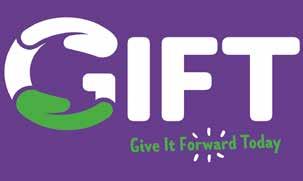
We’ll be serving a light meal, soup and sandwiches made by our brilliant GIFT Giving Kitchen volunteers, and then doing board games, activities, even a bit of volunteering all together. The magic is in the mix. Some people might walk in thinking they’re coming as a “recipient”
Last year, one of our GIFT recipients mentioned in passing that it was her birthday. She had no friends or family, no one to mark the day with. So, I got volunteers to send her cards and gifts. She rang me in tears and said she hadn’t had a birthday cake or a card in five years. That moment broke me a little but it also reminded me how powerful even the smallest gesture can be.
People often think loneliness means being completely alone, but sometimes
it’s just about a day that feels a bit too long. Or a week that drags. And let’s be honest, there are plenty of people who seem like they have family around but still feel invisible.
And don’t get me started on older people being “boring” – they’re anything but! They’ve got history, wisdom, and some seriously brilliant stories. I’ve had more fun with some of them than with my own friends and that’s saying something.
So, who is this for?
If you’ve got time and you fancy volunteering, come. Even if you’ve never done anything like this before. If your week feels a bit empty, come. You’ll find good food, good company and (hopefully) a good laugh. If you’re nervous, just try it. No one will know who’s there for what reason. You won’t be judged. You’ll just be welcomed.
My dream? That this grows. That we can run more sessions, try new things and build a little community that gives and gives and never stops.
To get involved, email roxanne@jgift. org
Roxanne Stross is the Community Engagement Manager at GIFT



On Thursday 8th May, more than 100 golfers attended the ninth biennial Golf Fore Chai golf day at Hartsbourne Country Club.
The event, hosted by Golf Fore Chai Committee members; Jo Fogel, Carolyn
Joels, Suzanne Richmond and Serena Smaje, raised over £77,000 for Support Groups for Young People.
A shotgun start kicked off the round of golf. Following the tournament, guests were welcomed by Jo Fogel, Chairman of the Golf Fore Chai Committee who presented awards to the winning teams.
The winning men’s team comprised of Simon Stern, Steve Rosebaum, Julian Goldie and Adam Bergman. The winning ladies team comprised of Gill Burns, Wendy Cohen, Candy Kaye and Alex Reid.
Following the event Jo Fogel said: “Each and every golf day, I am absolutely astounded by the generosity of our loyal supporters and this event was no exception. Even in these difficult economic times that we find ourselves in, we still managed to smash our target and
Please note: The views of the letters do not necessarily reflect the views of this newspaper. Letters may be edited and publication is at the discretion of the editor.
Dear Editor
Early last week, I had an infrequent moment in which I found myself expressing unusually strong opposition to elements of Israel’s latest strategy for the war in Gaza, straying unusually far in my agreement with mainstream opinion on aid and the latest language of some Israeli ministers.
My outrage barely lasted 24 hours, as I was suddenly brought back to my usual intellectual and emotional equilibrium by an all-too-regular reminder of why the fight for Israel against blatant untruth is so critical.
The prompt was one absolute howler of a statement from the UN’s humanitarian aid chief, the well-regarded Tom Fletcher, who on that Tuesday morning had told BBC Radio 4’s Today programme: “there are 14,000 babies that will die in the next 48 hours unless we can reach them”. The shockwaves reverberated almost
raised the incredible sum of £77,000 to go towards more support for the under 50’s age group. My thanks go to my small but mighty committee of Carolyn Joels, Suzanne Richmond and Serena Smaje who have helped tremendously in organising such a wonderful day and enabling us to raise these substantial funds.”
Chai’s Chairman, Louise Hager MBE
said: ““Jo, Carolyn, Suzanne and Serenayour passion, energy and tireless dedication breathe life into every Golf Fore Chai event. You are more than a committee - you are part of the Chai family. The creativity, care and professionalism you bring goes above and beyond and we are truly grateful for all that you do for us.”

on an incorrect reading of a UN report, which had warned of 14,100 imminent cases of acute malnutrition (not deaths), in children aged between six months and five years (not all babies), between April 2025 and March 2026 (not 48 hours).
In other words, almost every word of Mr Fletcher’s statement had turned out to be false. And yet the truth had barely got its trousers on, for the damage was already done worldwide. It was another Shifa Hospital moment.
instantaneously worldwide, reflecting the sheer urgency of the moment that Mr Fletcher had so starkly just laid out on UK radio. Only a heart of stone would not have felt the weight of those words, which had come, seemingly, from out of nowhere. And so, unsurprisingly, the world’s humanitarians, politicians, activists, media outlets acted with utmost speed.
The timing was particularly critical in the UK. The Foreign Secretary, David Lammy MP, was already due to make a statement later that day in the House of Commons, in which he would suspend UK-Israel trade negotiations and impose sanctions. But even the busiest of MPs due to attend had already learned of the news: Mr Fletcher’s claim was repeated on 13 individual occasions, by 13 different MPs of various stripes, in one of the most rambunctious and emotional Commons debates in recent memory.
The next day, however, it emerged that the BBC had identified a problem. It revealed that Mr Fletcher’s claim was based
At this point, one might well criticise me for dancing on the head of a pin - as even the correct reading of the report’s claims should (if true) sound alarm bells for those concerned about the humanitarian condition in Gaza. I am stressing this because the IDF itself had warned the government over the past few weeks that the satisfactory aid situation was fast becoming unsustainable. Indeed, part of my above-mentioned moment of outrage was over how the Israeli government could possibly have allowed a blanket aid ban to persist past a legitimate short duration, to such an extreme endpoint, without first having its own US-backed alternative in place.
Yet I do not see it as inhumane or pedantic to point out how a statement of such weapons-grade illiteracy had come directly from the mouth of no less than the UN’s humanitarian aid chief, who at the time of writing, has done nothing to undo it (only the UN body he represents has). Remarkably few media outlets have acted to undo what they had published. And as for the UK MPs who repeated it - of whom 12 have active social media feeds - only four have posted clarifications. One MP has even re-heated the claim on his feed, just last Sunday.
But it gets worse. The BBC, having
outed the falsehood in the first place, didn’t even publish a correction in its own right. Instead, its revelation was buried halfway down an article otherwise highly critical of Israel in isolation – all while a story over claims (already proven to be baseless) over Israel’s public vote at Eurovision remained plastered on the BBC homepage that whole evening. It is worth concluding by addressing one final counter: that none of this well-reasoned outrage actually matters. I paused to think on this, and yet, immediately recalled to my mind was that Shifa Hospital incident, which the BBC’s Jeremy Bowen later said he “didn’t regret”, despite the wildfire-like speed with which that untruth travelled. And the outburst of the UN’s Francesca Albanese to Piers Morgan, where, in explaining why she as a woman refused to believe the allegations of rape on October 7th, she ranted against all the journalists who uncritically repeated the separate, disproven claim about 40 beheaded babies.
That, for me, is why it matters. Israel is not simply criticised when it advances claims of doubtful veracity – it is castigated. But the UN’s top humanitarian diplomat utters what later turns out to be a complete falsehood, and we see that those who said it, those who repeated it, even those who exposed it as false, lack anything near the same appetite to undo it.
I may well find myself soon returning to another infrequent moment of outrage at Israel’s war strategy. But when double standards are so evident as to slap one in the face, they must immediately be called out for what they are, if we are to repair even a fraction of the damage.
Naji Tilley, London NW4
The Forum for Jewish Leadership (FJL), part of Jewish Futures, has achieved a landmark success in its inaugural international match funding campaign, surpassing its £400,000 target. The campaign, which brought together donors from around the world, is set to boost the organisation’s ability to empower the next generation of Jewish leaders.
Rooted in the belief that leadership begins with identity and grows through responsibility, FJL’s mission is to equip young Jews with the tools, inspiration, and conviction to step up for the Jewish
people and for Israel. Since its inception, the organisation has grown from a bold idea into a global movement, inspiring over 1,000 young Jews across the UK, Europe, the USA, Canada, and Australia. Each year, FJL has scaled its impact - and this summer will mark its biggest yet, with over 150 participants joining transformative leadership journeys in both Israel and the USA.
Director of FJL, Ben Thwaites, praised the community’s overwhelming response to the campaign:
“The support we’ve received
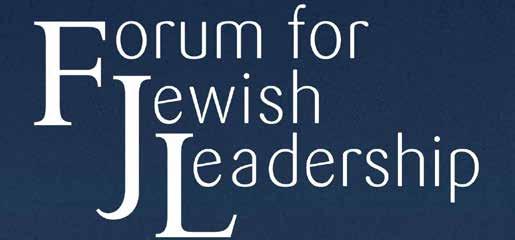
underscores the community’s deep commitment to nurturing Jewish leadership. This campaign has not only surpassed our financial goals but has also strengthened the bonds within our community, reaffirming our collective responsibility to ensure a vibrant Jewish future.”
The success of the campaign means FJL can now deepen its presence in key Jewish communities, expand access through increased subsidies, and invest in top-tier educators and mentors. The match funding model, where donations were doubled by key benefactors, created a powerful multiplier effect that galvanized participation and boosted community engagement.
In the wake of October 7th, with the Jewish world facing renewed challenges and increased scrutiny, the need for bold, values-driven leadership has never been more acute. FJL is rising to meet this moment - offering programmes that do more than teach leadership; they forge it.
Participants are immersed in intensive, values-based education, real-world experiences, and ongoing mentorship that prepares them to be effective, principled leaders for their communities and for Israel.
As FJL prepares for its most ambitious summer to date, the momentum from this campaign will serve as a launchpad into a new chapter of growth and impact.
From London to Los Angeles, Jerusalem to Melbourne, a new generation of Jewish leaders is stepping forward - inspired, equipped, and ready to lead.
To learn more about FJL’s work or to get involved, visit www.fjl.org.uk


• Suits all half price
• Sports jackets all half price
• Polo shirts £15 each 2 for £20
• Summer casual Jackets from £29.50
• Trousers £20 each 2 pairs £35 up to 50 inch waist
• Shirts £15 each and 2 for £25
Nearly 200 women came together for an unforgettable evening of inspiration, empowerment, and impact at the Jnetics Ladies Night: Knowledge is Power Dinner, hosted at St John’s Wood Shul. The venue was transformed into a vibrant hub of community spirit as guestsrallied in support of Jnetics and its life-saving mission to prevent Jewish genetic disorders.
The evening was opened by Nicole Gordon, CEO of Jnetics, who delivered a heartfelt welcome and a powerful overview of the organisation’s achievements over the past year. Nicole highlighted Jnetics’ central role as the engagement partner—alongside Chai Cancer Care—for NHS England’s Jewish BRCA Testing Programme, which is helping to identify individuals at increased risk of developing BRCA-related cancers. Over 30,000 people have signed up for testing to date—a remarkable milestone in this ground-breaking initiative.
Following a three-course dinner by Eat Me Events, guests were treated to an inspiring conversation between Vanessa Gold, Chair of Ann Summers and CoChair of West Ham United Football Club, and Deborah Joseph, editor and media personality.
In her first public address on the
subject, Vanessa Gold shared her deeply personal journey—reflecting on her decades of leadership at Ann Summers, her transition into the role of CEO in 2022, and her appointment as Chair in 2023 following the passing of her sister, Jacqueline Gold. Under Vanessa’s leadership, Ann Summers has continued its transformation into a dynamic, customer-focused, multi-channel business.
Vanessa also spoke of her role at West Ham United, a position that honours her family’s long-standing dedication to the club. She uses her platform to drive both business growth and meaningful community engagement.
In one of the evening’s most moving moments, Vanessa shared the emotional story of losing both her father and sister to cancer—an experience that prompted her to undergo genetic testing. Upon discovering she carried the BRCA1 gene mutation, she made the courageous decision to undergo preventative surgery.
“Sharing this story publicly for the first time is part of my mission to empower women—not just in business, but in life,” said Vanessa. “Awareness, early intervention, and community support can be life changing.”
She added “Every individual has to
make their own decision, but what I would say is that knowledge is power. And please remember—genetics don’t discriminate. I don’t consider myself Jewish, I don’t mix in Jewish circles, but having a Jewish father put me at high risk of carrying a faulty BRCA gene. I urge anyone with even one Jewish grandparent who hasn’t been tested to sign up for the NHS Jewish BRCA testing programme. It’s an incredible initiative for the Jewish community.”
Nicole Gordon closed the evening by emphasising the vital importance of community support for Jnetics’ mission: “The evening was hugely successful
in raising awareness of Jnetics’ life-saving work. The funds raised will directly support our efforts to educate and screen young adults for 47 recessive Jewish genetic disorders, in addition to the BRCA1 and BRCA2 mutations that disproportionately affect the Jewish population. With virtually no government funding, we are entirely reliant on the generosity of our community to sustain and expand our work.”
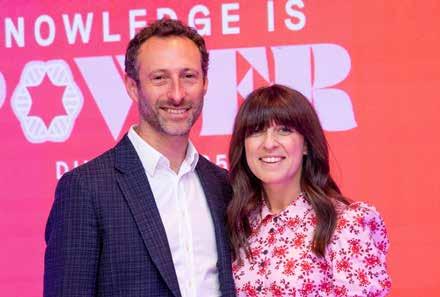
Ask the Expert, Trevor Gee.
Are you looking at a way to reduce your private health insurance premiums?
If you are, I can help you save money and perhaps even obtain higher cover.
I’m your local health insurance expert, Trevor Gee. I work with private medical health insurers to provide good levels of cover for you at affordable prices.
If you’d like to talk about how I can help you save money, please call me on: 020 3146 3444 or 07956 244350 or email me to: trevor.gee@patienthealth.co.uk.








Specialising in investments & tax planning for families and businesses for over 25 years.
• Strategies to mitigate IHT on primary residence
• Investments which you can keep in your name, yet swiftly ring-fence from IHT
• IHT efficient investments when acting for parents through a Power of Attorney
• Strategies to mitigate IHT on property companies & other assets
• Tax-Efficient Dividend Extraction Strategies
• Low-risk vehicles for surplus company cash with minimal corporation tax liability
• Pensions to reduce your corporation tax bill
• Shareholder Protection for Business Partners


Dear Rabbi
What with the festival of Shavuot coming up, I know there is a custom to stay up all night. But the last 3 years, my husband and son who did so, ended up sleeping most of the next day, pretty much spoiling the first day of the festival. Is this acceptable?
Celine
Dear Celine
It’s a great question: There is a beautiful and widespread custom to stay up all night learning Torah on Shavuot. The origin of this custom is based on a Midrash that the Jewish people actually overslept on the morning of the giving of the Torah. The reason for that requires further analysis beyond the scope of this column.
But here’s the key point: it’s a custom, not an obligation.
Rabbi Moshe Feinstein addresses this directly in (Igros Moshe Orach Chaim 4:21). He rules that if staying up all night will prevent a person from praying properly, or celebrating the festival properly the next day, it is better not to stay up all night. In other words, the goal of Shavuot is not sleep deprivation—it’s spiritual elevation.
Of course, for those who can manage it—and find that all-night learning energizes them—all the power to you. But for

To correct this spiritual lapse, Jews through the ages have embraced the night of Shavuot as an opportunity to demonstrate our eagerness and love for Torah by staying awake and learning until dawn.
others, staying up may come at the cost of the very things Shavuot is meant to celebrate. Tere are balanced options. Some choose to learn until 2 or 3 a.m. and then get a few hours of sleep before returning
to Synagogue. Others rotate learning in shifts or participate in a structured program with breaks. The important thing is not to trade depth for drama. So, by all means, study hard. Learn with passion. Learn with sincerity. But if your all-night Torah learning turns you into a cranky, half-asleep shell of a human for the rest of festival—maybe rethink the plan. Learn to listen to your body and your soul. G-d doesn’t need you bleary-eyed and barely functioning. He wants your heart. He wants your joy. He wants your Torah—not your exhaustion. And that may be the most important lesson of the night.
Dear Rabbi
My new mother-in-law will no doubt insist I eat her famous cheesecake on Shavuot in honour of the festival. I’m lactose intolerant. How do I survive the holiday and keep her happy?
Arthur
Dear Arthur
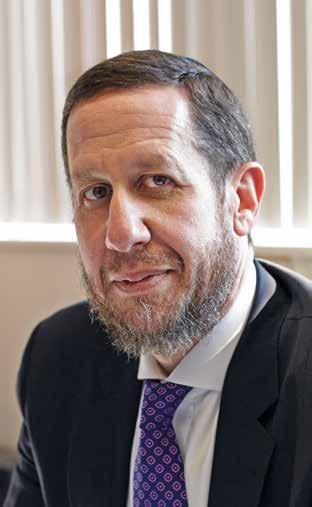
The custom of eating dairy on Shavuot is beautiful and symbolic. It reminds us that after receiving the Torah, the Jews could no longer eat their meat without proper kosher preparation, so they stuck to dairy. Also, the numerical value of “chalav” (milk) is 40—like the 40 days Moses spent on the mountain. Very spiritual. Very meaningful. But let’s be clear: it’s a custom, not a mitzvah, and definitely not a medical directive. So inasmuch as you want to
please your mother-in-law, and yes, honouring her is a mitzvah, still, if dairy turns your Shavuot into Shav-Ouch, skip the cheesecake. G-d gave us Torah, not tummy aches.
Feel free to celebrate with a non-dairy cheesecake, pareve ice cream, or a nice brisket. After all, nothing says “Sinai revelation” like soy-based blintzes and almond milk lattes.
Bottom line: however much you like the mother-in-law, honour the holiday, not the heartburn.














A free valuation from our in house gemmologist and gold experts on anything you may wish to sell. If you are thinking of selling, we purchase all Diamonds in any shape, size, clarity or colour. WE PAY MORE than all our competitors. Try us, and you will not be disappointed!

BY STEVE WINSTON
Governments, we are told, exist to secure the life, liberty and property of their citizens. Not to serve as the unwitting financial arm of a genocidal Islamist regime. And yet, here we are.
The British Government has been caught red-handed: knowingly pumping tens of millions of pounds in taxpayer money into Gaza through intermediaries working with – and in some cases under the direction of – Hamas. The same Hamas that launched a pogrom on October 7, butchered Israeli families in their homes, burned children alive, and still holds hostages beneath the ground.
This isn’t some well-meaning bureaucratic mistake. This is policy – documented, deliberate, and now exposed. Thanks to the painstaking work of NGO Monitor, we now know that the Foreign, Commonwealth and Development Office (FCDO) understood full well that its cash assistance programmes in Gaza were being coordinated with the so-called Ministry of Social Development – an entity run by
Hamas.
That’s not conjecture. It’s printed in their own risk matrix, where this obvious terror finance concern was downgraded to a mere “reputational risk.” Let that sink in. The UK government was not alarmed that British taxpayer funds might end up bolstering Hamas’s rule. It was alarmed that people might find out.
It is one thing for foreign aid to be wasted. That happens. It is quite another for foreign aid to be knowingly redirected to the arms of a proscribed terrorist organisation.
Since October 7, the British Government has handed over approximately £100 million in aid to the West Bank and Gaza. Much of it flows through opaque, unaccountable NGOs, who are then trusted – without question – to vet their own local partners. The result? British aid reaches organisations with open ties to the PFLP, a Marxist terror group responsible for bombings, hijackings and murders. Some of these same “aid workers” are now standing trial in Israel for killing civilians, including a 17-year-old girl.
Ask yourself: would this level of due diligence be tolerated in any other field of public spending? Would we accept
the Department of Health outsourcing hospital security to a firm affiliated with al-Qaeda, provided they filled in the paperwork correctly?
Of course not. But in the gilded world of foreign aid, where emotion eclipses reason and good intentions excuse everything, we are asked to suspend judgment. To say nothing, even when the money is flowing into hands stained with blood.
This is what happens when government is permitted to operate beyond scrutiny. Billions allocated in the name of “stability” or “humanitarian need” become, in effect, a blank cheque. No performance metrics. No meaningful oversight. And absolutely no accountability when things go wrong – even catastrophically wrong.
Libertarians have long warned that bloated government agencies, far removed from the people they allegedly serve, will always prioritise institutional self-preservation over effectiveness. What we are seeing in Gaza is not the exception. It is the rule. An entire apparatus whose first reflex, when confronted with evidence of terror financing, is not to intervene but to manage public relations. Every pound misallocated to Hamas
is a pound used to dig another tunnel, manufacture another rocket, train another killer. And every time the British state funds these networks under the guise of “social development,” it makes a mockery of its own anti-terrorism laws. Enough. It is time to impose a total and immediate freeze on all British aid to Palestinian-linked organisations operating in Gaza and the West Bank. No more money to NGOs coordinating with Hamas. No more reliance on partner self-vetting. No more subsidies for masked men with Kalashnikovs. And no more treating taxpayers like bottomless wallets for morally bankrupt experiments in appeasement. There must be a public, independent inquiry into how this happened – not another internal review, not a press release, but real accountability. The British people deserve to know why their hardearned money was used to support the infrastructure of terrorism. Foreign aid, like all government spending, demands scrutiny. When it goes wrong, the price isn’t just inefficiency. It is death, war, and ruin.
By Steve Winston, Managing Director, National Jewish Assembly




I am a independent broker acting solely on your behalf • I sell through many different auction houses, high-end dealers, collectors and private clients
• Having been in business for over 10 years looking after many, many clients you will always receive my personal discreet one-to-one service (references available)
• There is no cost or obligation meeting with me at your home or storage facility
• Probate valuations carried out
• Based in St Johns Wood, clients in the UK and Europe



BY RABBI NAFTALI SCHIFF
There’s a quiet danger in mistaking scholarship and wisdom for connection and relevance. Astonishingly, one can have a shelf full of the greatest books, quote Torah from memory, and still walk through life without internalising even a little of how or why to live it. It is possible to study holy texts for decades, and yet walk past a person in need, speak without thought, or treat others, including yourself- with coldness, cynicism, or indifference. You can engage in and even be an expert in Torah study whilst having no genuine relationship with the Giver of the Torah… and entirely miss what it’s trying to tell you.
Torah was never meant to be an abstract document.
It’s not a dusty tome of ancient ideas, nor is it an elite academic textbook reserved only for the top percentile of brightest minds. It’s not there to be admired from afar, annotated in ivory towers, displayed on mantels in leather-bound editions nor merely to foster intellectual inquiry without practical application.
Torah, by definition, is instruction. It comes from the Hebrew root “y-r-h”, the same root as yoreh, which means “to shoot” or “to pierce” through even the toughest ground. (See second paragraph shema) That same root gives us moreh, a teacher or a guide, because a true teacher doesn’t just offer information. A true teacher gives direction, helping each of us to pierce through the noise and discover what really matters.
And that’s what Torah is meant to be: Instruction for Living.
It’s not about merely pouring over or even memorising tracts of text. It’s about letting those texts penetrate your person and the life you lead. Torah is there to guide your everyday living; to change youyour relationships, your reactions, your moral compass, your sense of purpose. Torah wasn’t given in a vacuum. It was given in the wilderness of Sinai, teaching that its universal relevance transcends both time and space. As such it was and remains immediately applicable not to angels but to real people, living real lives, facing real dilemmas and decisions. And it continues to speak to each of us in just the same way today, and every day. We just need listen carefully and with personal integrity, allowing its eternal messages to penetrate our being.
The Ramban, Nachmanides, penned a timeless letter of ethical instruction to his son known as Iggeret Haramban. In it, he writes something deceptively simple: “Take care to study Torah diligently so that you will be able to fulfil it. Each time you get up from the book reflect upon that which you have learned in order to consider that which you may put into
practice.”
That line refocuses our entire approach to Torah learning. It moves us from lofty abstract to practical and applicable. From intellectually knowing to active and doing. From involved discussion to growing and becoming. It requires our Torah study to constantly encourage us to boldly ask not only “What does this mean?” but “What does this mean for me? How does it apply to my life?”
Too often, we confuse scholarship with spirituality. We over-intellectualize what was always meant to be internalized. Torah learning can become a race, a badge of honour, a contest of cleverness, rather than a mirror in which we examine our character and a guidebook to help us grow in all aspects of life.
“Eitz Chayim Hee”- This Shavuot, as we relive the giving of the Torah at Sinai let recapture for ourselves, our children, our students, our communities the Torah as the Tree of Life, the elixir of vibrant living with constant connection together with the Almighty and every aspect of the majesty of His creation.
Of course Torah contains unfathomable wisdom. It’s layered with hidden dimensions, scientific and literary elegance, and metaphysical depth. But even the most esoteric corners of Torah are not meant to remain locked in the world of theory.
with Torah learning, not only because of it’s intellectual stimulation and genius but because it opens and constantly deepens a true sense of clarity and purpose providing direction for an existence authentically connected to the Source of all life. Toras Chayim- is exactly as it says on the tin- instruction for living. Where better to look to live life to the full other than the handbook of the Designer, Creator and Sustainer of all?
That’s the power of instruction when it’s real. It is furthermore not imposed. It’s chosen. It’s absorbed. It predates creation, your creation. As such, it’s natural. It fits. It doesn’t weigh you down. It lifts you up.
When Torah is studied with the question, “How is this talking to my life?” -it comes alive. It’s no longer a subject. It becomes a guide to life. A source of vitality. And vitality is the key.
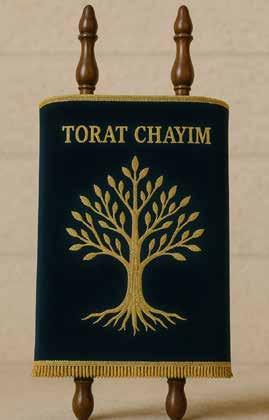
As the Kabbala informs us- Torah without action is like a body without a soul. Furthermore- Torah, G-d, and the Jewish People are one. The Torah is the living, ever present, ever relevant communication of the Creator to mankind.
Even seemingly abstract Torah and outwardly obscure mitzvot have very real life application, impact, resonance and relevance. There are not rituals for the sake of ritual; they’re designed to shape a certain kind of life; a cognisant, intentional and deeply connected one. A more conscious one. A more grateful one. A more compassionate, intentional, resilient and joyful one. The Zohar tells us that Torah actually predated the physical world. As such it is simultaneously the blueprint of creation and the handbook for constant and true connection with G-d Himself.
This is not an insight of religious piety. It’s an essentially human one.
True Bnei Torah are passionately in love
life’s demands, but from responding to them with courage and grace. That relationships aren’t about convenience, but about commitment. That time isn’t to be killed, but sanctified. That love is not just a feeling but a practice. That the little things- your words, your tone, your presence-are never little.
This is instruction for living. It’s in the way we greet people. The way we eat. The way we listen. The way we forgive. The way we raise children and bury our dead. The way we mourn, celebrate, work, rest, give, and grow.
And it’s all in there, if we know where to look. If we choose to look and to listen.
I once heard someone say: “Some people read Torah looking for loopholes. Others read it looking for life.”
That sentence stayed with me. Because it encapsulates the choice we all have-whether we’re studying a daf of Gemara, reading the weekly parsha, or just wondering what it means to live the life of a Jew in a complicated world.
“Ki hem chayeinu v’orech yameinu”—“For they (the words of Torah) are our life and the length of our days.”
Torah is not a document about life, nor merely a quick fix self help volume. It is life. It doesn’t sit to the side of your schedule, it’s meant to infuse every minute of it. It doesn’t demand you leave your personality at the door, it asks you to bring your full self, with all your complexity, into a conversation that began thousands of years ago and is still unfolding.
It’s instruction not just for living, but for living right.
Living with perspective. Living with depth. Living with meaning. Living with joy
Because what are we really looking for in life?
Success? Comfort? Stability?
Underneath all of that, most of us are searching for direction. For a path that is right. For values that resonate. For a compass that can guide us through the inevitable turbulenc, uncertainty, grief, loneliness, ambition, change and confusion.
And Torah offers that. Not by offering easy answers, but by offering anchored wisdom. It meets you in the mess. It meets you in the questions. It reminds you that you’re not walking alone, and that the way you walk matters.
It teaches that you can’t shortcut character. That real meaning, purpose and joy often come not from escaping
The Torah isn’t a rulebook. It’s a roadmap.
And it leads somewhere holy: to a life of connection, integrity, kindness, and purpose. To a life that matters.
We just have to read it that way.
With curiosity. With humility. With the question ringing in our minds: “What is this teaching me- not about ancient times, but about who I want to be right now and become tomorrow”
Instruction for living.
Not for scoring points. Not for passing exams. Not for winning arguments. Just for living.
And when we approach Torah that way, something astonishing happens: life becomes illuminated. Decisions become meaningful. Even the mundane becomes holy.
Because the Torah doesn’t ask us to be perfect. It asks us to aspire. It instructs us, guides us, supports us, through joy and grief, questions and convictions, growth and struggle.
That’s its greatness. That’s its everlasting gift.
And that’s why we keep learning it. Not just to know, but to become.
Instruction for living.
Shabbat Shalom

///What3Words is a geocoding system that has divided the world into a grid of 57 trillion 3-by-3 squares, each of which is identified by a unique three-word address. In this column, Rabbi Naftali Schiff reflects upon three words each week, relating to core issues of the day. Feedback welcome! nschiff@jfutures.org
Rabbi Naftali Schiff is the Founder and Chief Executive of Jewish Futures



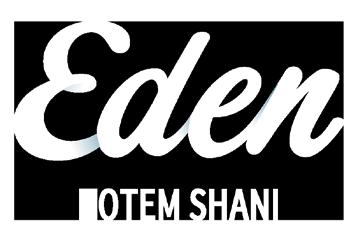
LIST OF AMENITIES:
SHUL | EVENT SPACE | GYM | KIDS CLUB | PLAYGROUND COMMUNITY COURTYARD | OUTDOOR FITNESS AREA
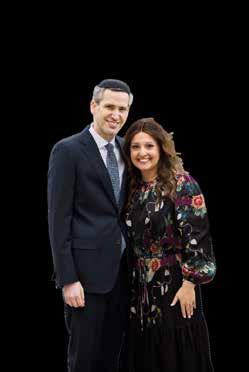
LED BY RABBI BENI & CHANI KROHN

BY RABBI SHAUL YONATAN TAWIL
Are You a Builder or a Destroyer? It is a stark question.
One that challenges the very core of who we are.
Are we building — or are we, unknowingly, destroying?
King Solomon tells us:
“Chochmat Nashim Banta Betah — the wisdom of a woman builds her home.”
But in the very same verse, we read: “Ve’ivvelet B’yadeha Tehar’senu — and with her own hands, the foolish one destroys it.” (Mishlei 14:1)
Every person has tremendous power — especially women. The Torah does not just suggest this, it proves it.
Let us take a look at two powerful women.
When the Jews were in the wilderness there was a rebellion against Moshe Rabbenu led by Korach. The real instigator behind the rebellion was Korach’s wife. She whispered in his ear, fanned the flames, and the result? Destruction. Not only of him, but of his entire household — and hundreds of others.
In contrast there was another rebel called On Ben Pelet who had joined with Korach. When the time came to appear in the morning, his wife went outside the tent, took of her hair covering so no one would draw near and thus saved him from joining the rebellion that took place that morning. that with the wife of On ben Pelet. He was also lined up to join the rebellion. But she stopped him. She saw the danger; she used her wisdom — and she saved him. Not just physically, but spiritually. She built their future.
Women are at the heart of our nation’s history.
When we left Egypt, the Torah relates that we left with 600,000 men of a certain age — but our sages are clear: It was in the merit of the righteous women that we were redeemed. (Sotah 11b)
It was the women who never despaired of G d’s redemption. In fact, while the men had lost heart and were dejected and had no desire to procreate, not wanting to subject their children to the hardships of slavery, the women were upbeat—confident that a better day was soon to come. They seduced their husbands in the fields and raised a generation of children who witnessed G d’s miraculous salvation.
They believed. They built. They did not give up. They saw a brighter future — and instilled that vision in their husbands, in their children.
Yocheved and Miriam worked tirelessly with the next generation, nurturing them even in the darkest times. They laid the foundation for our redemption. When the Jews left Egypt, the women took with them tambourines and musical instruments. Why? They were certain that G-d would continue to bring salvation to His people. Their Emunah was even stronger than the men.
Even as we left Egypt, we were not fully free.
Freedom has two parts. The first is the physical freedom. That happened on Pesach. Yet when a prisoner is freed, he still remembers his suffering. A massive new transition needs to happen in order for him to get back to normal life. Similarly true freedom for our people only came at Har Sinai. That was when we were mentally and spiritually free - when we received the Torah on Shavuot — that’s when we truly became a nation.
Every year we commemorate our ancestors experience at Har Sinai in the synagogue reading the ten commandments. But we also read a very special Megila – Megilat Rut!
Why Rut?
Let us look at her mother-in-law, Naomi.
She once had everything — a noble husband, wealth, comfort. But when her husband chose to leave Eretz Yisrael in a time of famine, Naomi did not stop him. She had the influence. She had the strength. But she stayed silent.
Her husband was known as Ish Naomi – he assumed he was in charge and therefore led the family away. In reality if she would have pushed, she could have influenced him to stay, and the story would be different.
Years later after they had abandoned their people and the Holy land of Israel, her husband and sons had died, her wealth had diminished, she returned to Israel broken, poor, and alone — but with Rut by her side.
Why did Rut follow her?
Naomi had realised her previous mistake. She was now alone and determined to rebuild. Vatakam – she arose from her sorry state and reacted. She still had something powerful: a spark of Emunah, a deep connection to Torah and Eretz Yisrael. Rut saw it. She felt it. That Hashpa’a — spiritual influence — radiated from Naomi. Even in her brokenness, Naomi inspired.
And Rut? She left her royal background in Moav, followed her inspiration, and became the mother of royalty. The great-grandmother of David Hamelech.
The matriarch of Mashiach!
That is the power of a woman.
Today, we still carry that power. In today’s world, we understand currency. Money. Shopping. Deals. But in Shamayim (the heavens), the currency is different. No one can spend their money after they die. No one is going to enjoy that luxurious car when they are return to dust. The real currency that we can already start to invest in is Emunah, Torah and mitzvot.
When a man learns Torah, they are rewarded – Keneged Kulam – as if they are doing all 613 Mitzvot. Torah is extremely powerful. What about a married woman? When her husband learns — even for one hour — she shares in the reward and if she is the instigator in his learning, she becomes the main (majority holder) partner!
Rabbi Yitzchok Zilberstein (Alenu Leshabeach0 relates that, “Rabbi Yosef Chaim Sonnenfeld told his wife: “You will certainly merit the World to Come, because here, in this world, you have always done your utmost to ensure that I have been able to sit and engage in Torah and serving Hashem. When you get there, tell them that the World to Come will be much better if they let me in too–and I will get in in your merit.”
There is a beautiful story of a man in Kollel who was using his break time to relax. The rabbi told him, “Your wife gets more reward than you. She encouraged you to come. She believed in your learning — even in the time you are not learning, she is investing in you.”
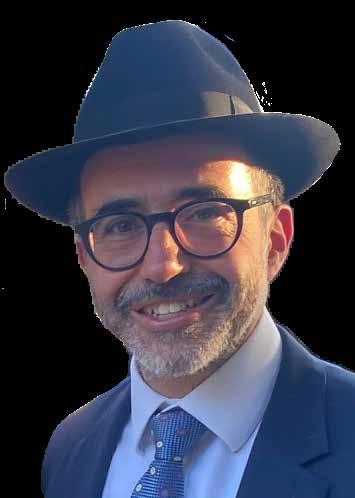
To the men – start learning – connect to G-d’s Wisdom. If you are already learning – aim to do it Lishmah –for G-ds Sake.
Ladies — let us be builders and motivators. Apart from your own Torah growth, help encourage that extra hour of learning from your husband and children.
This Shavuot let us all together commit to bring Torah into our homes — at
the Shabbat table, with the kids, in our conversations.
Torah brings life. Torah is life.
Let us build our homes. Let us build our people. Let us build the future.
Chag Sameach
The National Jewish Assembly (NJA) is calling for the immediate suspension of all UK aid to Gaza and the West Bank following revelations that British taxpayer money has been knowingly funnelled to Hamas-linked entities under the guise of humanitarian assistance.
According to evidence uncovered by NGO Monitor, the UK Foreign, Commonwealth and Development Office (FCDO) has continued to fund aid programmes coordinated with the so-called Ministry of Social Development (MoSD) in Gaza - an institution effectively controlled by Hamas, a proscribed terrorist organisation responsible for the mass atrocities of October 7. UK-funded cash assistance, administered by UNICEF and the Norwegian Refugee Council, was distributed with Hamas’s involvement even after the massacre.
These revelations expose a staggering failure of oversight. Internal FCDO documents acknowledge the risk of UK aid supporting Hamas but dismiss it merely as a “reputational” concern. The UK Government, in effect, chose to protect its image rather than uphold the law or prevent terrorist financing.
The NJA is demanding a full independent investigation into how this funding was approved, who authorised it, and what safeguards were
deliberately ignored. Until then, the Government must suspend all aid to organisations operating under Hamas oversight or in partnership with terror-affiliated NGOs.
NJA Chairman Gary Mond said: “This is one of the most egregious misuses of taxpayer money in recent memory. It is morally indefensible and strategically insane. The British public is being forced to subsidise the infrastructure of terrorismthe same terrorism that led to October 7. There must be accountability, and there must be a complete halt to this funding immediately.”
This is not a matter of diplomatic nuance. It is a national scandal. UK law prohibits support for terror entities. Yet, the Government continues to look the other way, funding mechanisms that Hamas exploits to rearm, regroup, and rebuild.
The NJA urges Parliament to take immediate action, and for all aid to Gaza to be frozen.

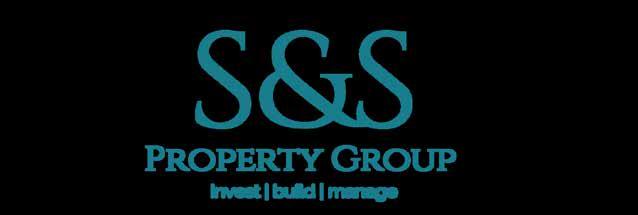


After a dramatic slowdown in Israel’s property market in 2023 — driven by rising interest rates and the Iron Swords War — new data from the Israel Tax Authority reveals an early rebound in 2024, led largely by investors and foreign Jews. While overall transaction volumes remain below peak levels, Purchase Tax revenues rose 16% in 2024, and investment property prices surged, particularly among overseas buyers and new immigrants. The report sheds light on how international demand is reshaping market trends and contributing a disproportionate share of tax revenue.
A new report released by the Economic and Planning Division of the Israel Tax Authority reveals key trends in the Israel real estate market and taxation revenues between 2021 and 2024. The data highlights a significant slowdown in real estate activity that began in early 2023, deepened following the outbreak of the Iron Swords War, and began showing signs of recovery in mid-2024 — largely driven by investors and foreign buyers.
Due to the sharp cooling of the market in 2023, revenues from real estate transaction taxes dropped substantially. Purchase Tax (Mas Rechisha) collections fell by 43%, while Capital Gains Tax (Mas Shevach) revenues declined by 49% compared to the record-breaking year of 2022.
The downturn reflected a widespread freeze in market activity, particularly after the start of the war in October. However, the first signs of recovery appeared in the second half of 2024. By year-end, Purchase Tax revenues had increased by 16% compared to 2023, signaling renewed buyer activity. Capital Gains Tax revenues, meanwhile, continued to decline but at a slower pace — just 5% lower than the previous year.
While much of the market remained stagnant, investor activity, particularly among those already owning a property, picked up significantly. After a modest price increase in 2022, the median price of an investment apartment rose by 11% in 2023, reaching 2 million shekels. The trend accelerated in 2024, with an additional 14% jump in the first half of the year, pushing the median investment property price to 2.3 million shekels. Interestingly, this price growth was not mirrored in purchases of land, first homes, or upgrades by existing homeowners, suggesting that investment buyers — likely seeking stable assets or inflation hedges — have been a key force in the market’s partial recovery.
The report also highlights a striking
gap in the prices paid by foreign buyers and new immigrants (olim) compared to veteran Israeli investors. In 2023, the median price of an investment property purchased by a new immigrant was 73% higher than the general median price for investment apartments. Similarly, foreign residents paid 71% above the market median.
Despite their relatively small share in the number of transactions — just 1% of investment purchases by olim and 10% by foreign residents — these groups had a disproportionate impact on tax revenue. Foreign buyers, in particular, paid full Purchase Tax with no exemptions or reductions, contributing 432 million shekels in 2023 — a full 15% of all Purchase Tax collected from investment property purchases that year.
For prospective foreign buyers and olim, the report offers several insights:
• Pricing Power: Foreign residents and new immigrants are paying premium prices, often well above local investor levels. This may be due to less familiarity with market norms, urgency, or preference for high-end areas.
• Tax Burden: Unlike Israeli citizens or residents who may benefit from exemptions, foreign investors are typically subject to the full 8-10% Purchase Tax rate for investment properties.
I wonder, as a parent, if you have heard these types of exclamations from your teenage children who are now sitting their exams? Jteen has received lots of contacts from anxious teens who are struggling with the pressure and anxiety of the exam season. So how can you help your child feel calmer? Here are 7 easy tips that can make a huge difference.
1. IT IS NORMAL
It is a common phenomenon in psychology to worry about worry. We think it is a problem to worry, so become even more worried. When it comes to exams, parents often quickly become excessively worried about their childrens’ exam anxiety, which then only makes the child more anxious. What we should do as parents is appreciate that anxiety and pressure around exams are normal. The big difference is that we are going to help our teen control their anxiety, rather than letting it control them.
It is the oldest trick in the book, but perhaps the least practiced! Everyone needs sleep for their brains to concentrate and focus to the maximum, none more so than the developing teen brain. Encourage your teen, especially the night before an exam, but ideally a few days before, to hit the pillow and forgo the late night/early morning cramming sessions. Sleep is putting your mind and body on recharge mode. So, coming to the exam with a full battery is a sure way to beat off
anxiety and stress. Also remember that caffeine consumption which is often used to give more energy to study, can often impact on sleep quality and patterns.
Many of us know the phrase, “think good, feel good.” This idea demonstrates the key role that thoughts play in the way we feel. If a person goes into an exam thinking that their whole life depends on getting a good grade right now, how do you think they will feel? Obviously, very anxious. Help your teen put the exam into the correct perspective, “It’s important to do well and I want you to try your best, but it’s not the end of the world and you certainly are not a failure if you don’t.” This is a much healthier attitude and will consequently lead to healthier feelings. There is one snag. Parents are often the ones who are influencing a teenager’s perspective on the significance of an exam. If we transmit a healthy perspective on exams that will undoubtedly result in a calmer mindset for our children.
Many of the teens who have reached out to Jteen with exam anxiety acknowledge that the problem is exacerbated by their lack of preparation and efficient use of revision time. Concentration and focus have become harder to obtain, largely due to the proliferation of distractions, usually devices that compete more than ever for a teen’s attention. Help your teen create a study environment which
• Market Dynamics: With the broader market still stabilizing, investor-driven segments — particularly those influenced by international buyers — are leading the recovery and price increases.
As Israel’s real estate market adjusts to new economic and geopolitical realities, understanding these trends is essential for anyone considering a property purchase in Israel.
Buyitinisrael.com is the leading English-language platform for navigating the Israeli real estate market. We’re a mission-driven platform created to empower English-speaking buyers from around the world with everything they need to buy with confidence — and feel at home in Israel. For personal assistance in finding your home in Israel or any other enquiries email debbie@buyitinisrael.com.
The contents of this article are designed to provide the reader with general information and not to serve as legal or other professional advice for a particular transaction. Readers are advised to obtain advice from qualified professionals prior to entering into any transaction.

is free of distractions, whilst at the same time building structured breaks into the revision time. Students who generally have access to social media have found huge improvements to their concentration levels when social media apps are deleted off their phone for their study and exam period.
5.
It seems obvious but being late can make a stressful situation even more difficult. Rushing to show up on time might only add to your child’s stress before the exam and they are then far more likely to carry that with them into the exam. Getting your teen to the exam location early prevents those issues. Plus, it provides some time to transition from one’s everyday headspace to “exam mode.”. Coming prepared, not being hungry, and a healthy mindset on the day of an exam does wonders for a teenager’s prospects in the examination room.
6. REMEMBER TO BREATHE!
Breathing may seem absurdly simple — after all, we do it practically every second. But it can be a surprisingly powerful tool to soothe anxiety. The diaphragmatic breathing technique achieves this goal. Slow breathing reduces the heart rate, lowers the blood pressure, and allows the body and mind to chill out. Try it yourself so you can effectively teach it to your teen for when they are feeling anxious:-
• Breathe in slowly and gently
through your nose.
• Let your abdomen (diaphragm) expand alongside your ribs, rather than breathing through your chest alone.
• Very slowly and gently breathe out of your nose.
• Repeat the cycle until you feel calmer.
That is it. It is easy and can be used before and during an exam to relieve anxiety.
Teenagers being teenagers often want to feel independent and might be reluctant to share their feelings or listen to advice from parents. As a parent, it’s important to recognise that this is normal teenage behaviour, whilst at the same time encouraging them to reach out for support. Encourage your teenager to contact Jteen so that our trained counsellors and therapists can help him/her cope with the pressures and anxiety that exams so often bring.
Yaakov Barr is a psychotherapist, clinical supervisor and founder of Jteen. The Jteen helpline is open for teens every night from 6pm-midnight. The number to text is 07860 058 823 and to call is 0800 915 46 46






Shavuot Reflections, Regional Insights & Seamless Support from Israel Properties by Stamelman & Partners
As we approach Shavuot—a time of renewal, revelation, and connection—we reflect not only on the giving of the Torah but on what it means to build something enduring. For many Jewish families in the UK, that includes creating a tangible connection to the Land of Israel.
Whether for future Aliyah, family holidays, retirement planning, or investment, owning property in Israel is an expression of continuity and belonging. At Israel Properties by Stamelman & Partners, we are proud to accompany families from the UK and beyond on this meaningful journey—with discretion, care, and experience.
With more than two decades of experience serving English-speaking clients, we offer an insider’s perspective into Israel’s most sought-after communities—along with personalized access to select properties that meet your goals, lifestyle, and budget.
Here is a curated overview of some of the most relevant regions for our UK clients this year:
Ramat Beit Shemesh (Aleph, Gimmel, Daled, Neve Shamir Mishkafayim Ramat Shilo & Surrounds )
• Community: A well-established centre for Anglo families, with strong Dati Leumi and traditional communities. Known for excellent schools, religious infrastructure, and family-friendly amenities.
• Property Types: 4–5 room apartments, duplexes, garden apartments, and penthouses in both second-hand and new developments.
• Prices:
4-room (new or lightly used):
₪2.3M–₪2.8M
5-room: ₪2.8M–₪3.5M
Garden/Penthouse units:
₪3.4M+
• Forecast: Continued demand as infrastructure expands. Popular among young families, retirees, and long-term investors.
Jerusalem (Baka, Katamon, Arnona, Rechavia, Talbiya)
• Community: Diverse Anglo presence with rich cultural, educational, and religious offerings. Ideal for buyers seeking history, vibrancy, and walkability.
• Property Types: Boutique apartments, garden units, and luxury renovations in stone buildings.
• Prices:
Standard 3–4 room apartments:
₪3.5M–₪5.5M
High-end/luxury 5-room+ or penthouses: ₪6M–₪10M+
• Forecast: Premium pricing remains steady due to scarcity of land and
historic value. A lifestyle location with strong long-term equity.
Modiin
• Community: Modern city with a blend of Anglo Olim, professionals, and Israeli families. Known for parks, planning, and ease of access to Tel Aviv and Jerusalem.
• Property Types: Apartments, cottages, private homes, and newer luxury projects.
• Prices: 3-room apartments: ₪2.5M–₪2.9M 4–5 room: ₪3.2M–₪4M
Semi-detached/town homes: ₪4.5M–₪5.8M
• Forecast: Consistent interest from young professionals and families. Ongoing development with growing longterm value.
Forecast: Strong ongoing development near the coastline, with tourism and infrastructure expansion contributing to interest from both end-users and investors.
Netanya (Ir Yamim, Park Hayam, North Netanya, Kiryat Hasharon)
• Community: A coastal city offering a blend of seaside living and urban convenience. Netanya is popular among UK, French, and South African buyers, USA & Canada with a strong Anglo presence.
• Property Types: High-rise apartments with sea views, garden units, and penthouses
• Prices: Ir Yamim (sea view): ₪3.5M
- ₪5.5M+
North Netanya/Kiryat Hasharon: ₪2.6M–₪3.4M
Park Hayam: 4-room apart ments: Starting from ₪2.98M 5-room apartments: ₪3.69M
– ₪4.26M
Mini-penthouses: Up to ₪5.45M Penthouse units: Prices vary based on specifications
• Forecast: Netanya continues to experience growth, with ongoing development near the coastline. The city’s infrastructure expansion and tourism appeal contribute to steady demand from both end-users and investors.
Tel Aviv (Old North, Bavli, Neve Tzedek, Florentin)
• Community: Israel’s cultural capital and financial hub. Urban, cosmopolitan, and architecturally diverse.
• Property Types: Luxury high-rises, Bauhaus buildings, boutique penthouses.
• Prices: Central 3–4 room apart ments: ₪4.8M–₪7M
Luxury units and sea-facing penthouses: ₪7M–₪12M+
• Forecast: Premium market with strong resilience. Ideal for lifestyle buyers, frequent visitors, and long-term capital preservation.
Carmei Gat
• Community: Quiet, modern neighbourhood with growing religious
and Anglo presence. Attractive for firsttime buyers and investors looking for value.
• Property Types: Spacious newbuild apartments and small cottages.
• Prices:
4-room new apartments: ₪1.7M – ₪2.3M
Garden apartments and upgrad ed units: ₪2.4M+
• Forecast: Increasing interest as infrastructure grows. Good entry-level value with long-term growth potential.
Ashkelon (Barnea, Marina, Afridar)
• Community: Affordable coastal city with improving amenities and an emerging Anglo footprint.
• Property Types: Apartments in newer towers, older units with sea views, and garden homes.
• Prices:
3-room apartments: ₪1.45M –₪1.85M
4-room: ₪1.8M–₪2.3M
Sea-facing or large homes: ₪2.5M–₪3.2M
• Forecast: Up-and-coming for holiday homes, retirees, and investors seeking good value near the coast.
Beyond the most popular centres, many of our UK clients are exploring emerging areas offering excellent value and community life:
• Zichron Yaakov – Mountain views, vineyards, and a peaceful atmosphere
• Harish – Fast-growing, affordable, and family-focused
• Givat Shmuel – Close to Tel Aviv and Bar-Ilan, great for young professionals
• Tiberias, Migdal, Kinneret –Scenic vacation or retirement locations with future rental potential
• Kochav Yair, Raanana, Herzliya
– Suburban elegance with strong schools and amenities
We are happy to assist with properties in these and many other areas—even if not listed above.
At Israel Properties by Stamelman & Partners, we are more than agents—we are your trusted advisors and partners. We understand that purchasing property in Israel is a personal decision, and we are committed to guiding you every step of the way with professionalism, transparency, and care.
Our bespoke services include:
• One-on-one consultations (in-person or virtual)
• Curated
property search and market insight
• Full legal, mortgage, and financial guidance through Anglo-trusted partners
• Video tours, reports, and side-by-side comparisons
• Project management for new builds or renovations
• Property Management
• Rentals
Whether you’re ready to begin or simply exploring options, our team is here to support you with no pressure, and with complete discretion.
This Shavuot, as we recall standing together at Sinai, we are reminded of the enduring relationship between our people and our land.
For those considering a home in Israel—whether now or in the future—this is a time for reflection, exploration, and envisioning what legacy and belonging look like for the next generation.
We would be honoured to accompany you on your journey.
What our clients say:
“I highly recommend Israel Properties. The entire team is professional, friendly, Ehrlich and responsive. Toviyah and Shirley repeatedly went out of their way to accommodate us and make the purchasing process stress-free and enjoyable. They take great pride and joy in helping people buy property in Israel and you cannot help feeling the glow of their warmth” - Gary
“Lara and Israel Properties was an amazing support for us when we where selling an apartment in Jerusalem. She was always accessible and available and she responded promptly whenever we needed her assistance. She went well beyond what we could have expected from an agent and we always felt that we were in the hands of someone who had our best interests at heart.” - Daniel R, London
Let’s start and continue this Journey together
Website: www.israel-properties.com
Email: Toviyah@israel-properties.com
Israel Line: +972 50 446 9515
From our team to your family—Chag Shavuot Sameach.
May your journey forward be filled with clarity, peace, and purpose.
We’re here to help you make Israel feel like home—one thoughtful step at a time.













Welcome back, we’re up to a new sefer, a new book. This one is called Bamidbar. A) Because the first parsha is Bamidbar B) It’s all about, bamidbar, what happened in the desert.
Most of Vayikra is Hashem telling Moshe stuff, our story hasn’t moved on. Now we’re ready to leave Mount Sinai and rock and roll to Israel!!
First, we get counted, a lot of people died after the whole golden calf, eigel, thing. Plus, you have a card collection or money? Ever count them? Go through them? Why? Because you love them so much! That’s what G-d does with us, He really, really loves us and He shows it with all the counting.
Levi don’t get counted with everyone else, they’re different.
Now, we get given flags. The flags are made of silk and match the color of the gem stone that represents that tribe on the Kohain Gadol’s Choshen -breastplate. Reuven - He’s got a red flag. His symbol is a mandrake, a kind of plant that grows in the wild. Reuven chose these flowers for his mother because he wanted to make sure they did not anyone elses property. His tribe was very careful not to steal. The flag of Shimon is green with an embroidery of a city, representing Shechem which was the first city we ever conquered. Levi -The flag of Levi is white, black and red. White because it’s pure, black because they don’t have a lot of stuff and nonsense, and red for the blood of the korbonot. Upon it is embroidered the Choshen breastplate
S
Y E Y F K F E N T W Q N
Z J N H X S D N I U W L
S U S N E C T Q Z E A M
Y I H C Y O X U L I L H
M A A I H T U R X D G D
P K V C C D H H B R M E
E E U F C Y X S S C R D
L L O N Q M M L F X B J
W Z T X X F G J V N G Z
that the Kohain Gadol wears. Yehuda -Yehuda’s flag is the color of t’cheilet, the blue dye that was used for tzitzit. On the flag is embroidered a lion, the symbol of royalty. From the line of Yehuda comes King David and all the other kings and Moshiach. Yissachar’s flag is black, again he doesn’t own a lot of things in this world. On it is a sun and moon because the tribe were great astronomers which is very important for lots of things in Judaism. Zevulun is white because he has the best reasons for his business; supporting the tribe of Yissochar so they can learn. On it is a ship because they were sea merchants. Dan has an opal-colored flag and the serpent embroidered on it, both hint to Shimshon, the mighty warrior who later fought off the Philishtim. The flag of Gad
is woven from black and white threads. A troop of soldiers is embroidered on the silk cloth. Gad were the soilders of Klal Yisrael. Naftoli’s flag is the colour of diluted wine because they listened to the Sanhedrin and Torah is compared to wine. On it is a deer because Naftoli is known for being swift. Asher’s flag is a pearl color silk. Upon it an olive tree is embroidered. Asher’s portion in the land of Eretz Yisroel is filled with olive trees. Then we discuss who travels where and how to take down and set up the Mishkan. The Levim do that, and carry it and Elazar, Ahron’s son is in charge. So off into the sunset we march, where to next? Find out next week!
Number of Verses - 159
Number of Words - 1,823
Number of Letters - 7,393
This week’s Question: Which weekly Parasha is never read (outside of Israel) on Shabbat afternoon.
Last week’s Answer: As the sun moves from east to west, Shabbat and Yom Tov occur first in Israel, and then in USA. Which mitzva is observed first in New York, and then in Jerusalem?
Reading Megillat Esther!
In New York (as in most places inside Israel and out) Purim is celebrated on Adar 14. But in Jerusalem, as in any city which had a wall around it in the days of Moses and Joshua, Purim is celebrated on Adar 15. This distinction commemorates the special miracles experienced in Persia’s capital, the walled city of Shushan.
***Well Done To Laura Samuel, HA8***
Using all the shapes, can you make the shape on the right?
The goal of a word wheel puzzle is to create as many words possible with the letters in the word wheel. Each word must contain at least three letters. You can only use each letter once and every word must have the letter in the centre of the wheel.
Last edition’s words
Here are some words you may have found from last week – you may have found more!
E C Y E R T R A S
Use the area below to write the words you have found.
Q: What dinosaur had the best vocabulary?
A: The thesaurus!
Q: Why did the man put his money in the freezer?
A: Because he wanted cold hard cash!
Q: What is orange and sounds like a parrot?
A: A Carrot!
3. What starts with a T, ends with a T, and has T in it? Answers 1. Halfway. After he gets halfway, he’s walking out of the forest 2. It makes a splash 3. A Teapot age air ape are ave ear era gap nag nap pan par pea rag ran rap van via earn eave gain gape gave gear nape nave neap near page pain pair pane pang pare pave pear rage rain rang rave reap vain vane agree anger eager grain grape grave naive pager range raven vegan avenge enrage graven paring paving ravine raving regain avenger engrave reaping vinegar repaving grapevine
1. How far will a blind dog walk into a forest?
2. What happens when you throw a yellow rock into a purple steam?
In an era where finance often feels faceless, Plan Funding Solutions Limited stands out with a rare blend of bespoke service and strategic expertise. At its helm, Director Meir Plancey is redefining what it means to broker with precision and purpose.
In today’s fast-paced financial landscape, access to funding can make or break opportunity. But for many individuals and businesses, the path to the right financial solution is anything but clear. Enter Plan Funding Solutions Limited, a boutique finance brokerage with a distinctive approach: tailored strategies, transparent guidance, and a commitment to placing clients’ long-term goals above all.
Founded on the principle that finance should be both personal and professional, the firm specialises in structuring bespoke funding arrangements across a wide range of sectors—from property finance for Buy to Lets, HMOs, large portfolio refinancing to exceptionally fast bridging loans. But what truly sets the firm apart is the vision and leadership of
Director Meir Plancey, a respected figure in the finance industry known for his thoughtful, client-first ethos.
“We’re not a volume business. We’re a value business,” says Plancey. “Every client has a story, and every funding need deserves a solution that is as unique as their circumstances.”
Boutique by Design
Unlike high-volume brokerages that rely on templated solutions, Plan Funding Solutions embraces a boutique model— intentionally selective, deliberately agile, and deeply consultative. The firm’s size is its strength: clients work directly with senior advisers, benefitting from nuanced insights and industry connections that only years of experience can bring.
Whether it’s structuring complex bridging loans or navigating development finance with tight timelines, Plancey and his team are known for their ability to unlock doors that others can’t. Their approach is meticulous, ensuring no stone is left unturned in pursuit of the optimal financial outcome.
Deep Relationships, Lasting Impact
The brokerage’s success is built on
long-term relationships—not quick wins. Much of its business comes from referrals and repeat clients, a testament to its reputation for integrity and results.
“We often see clients who come to us after being told ‘no’ by others,” Plancey explains. “Our role is to reframe the challenge and find the ‘yes’—whether that’s through creative structuring, the right lender match, or simply understanding what others missed.”
As market conditions fluctuate and regulatory frameworks evolve, the need for knowledgeable, ethical finance professionals has never been greater. With decades of combined industry experience, Plan Funding Solutions is perfectly positioned to guide clients through the maze—offering clarity, confidence, and custom-built strategies.
In a world where
funding is often reduced to numbers on a spreadsheet, Plan Funding Solutions brings humanity back into finance. Under Meir Plancey’s guidance, the firm continues to prove that real expertise isn’t just about what you know—it’s about how you apply it, and who you serve in the process.
Looking Ahead
As the financial brokerage continues to expand its footprint, its mission remains unchanged: to be a trusted partner, a strategic thinker, and an unwavering advocate for its clients’ success.
“We don’t just find finance. We fund futures,” Plancey concludes. “And that’s something we take personally.”

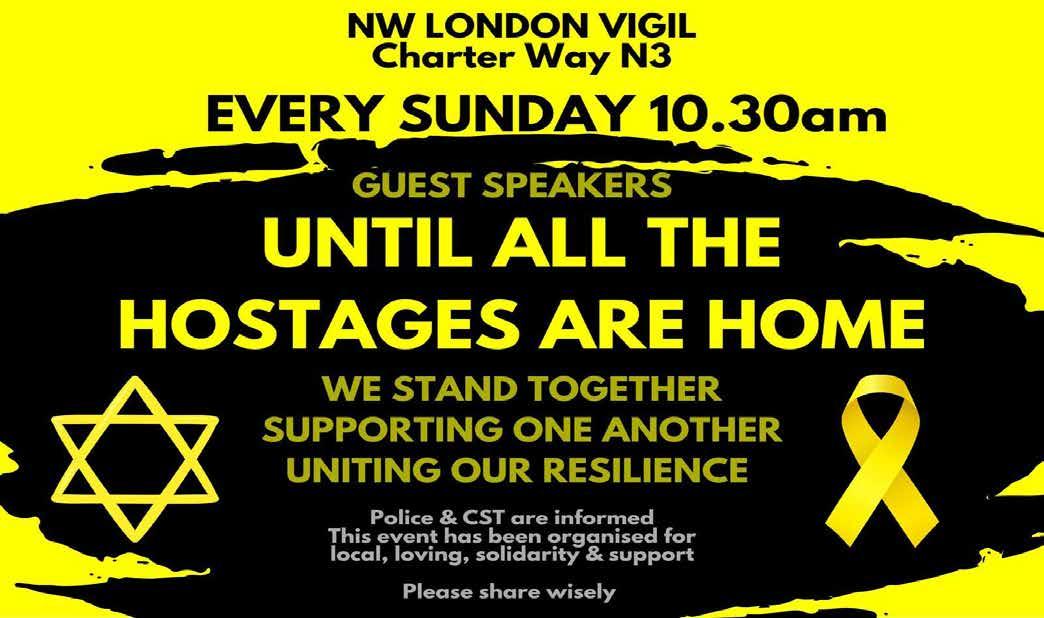






















Offers in excess of £900,000 Riverside Drive, Golders Green Road, NW11
Priced to Sell - Riverside Drive, renowned as one of the most prestigious blocks in Golders Green & we are pleased to offer this front facing first floor 3/4 bedroom purpose built apartment. Currently setup as a three bedroom flat with a study & separate utility room & presents very nicely ! To the rear of the flat is a nice size kitchen morning room & in front of that is a wide spacious dining room lounge with plenty of both dining & lounging area as well as a balcony overlooking Golders Green Road. The property is only half a floor up from the main entrance, the service charges include hot water & heating & there is a wonderful porter onsite during the day Service charges are approx £10,000 PA we are advised that the new management company are working on getting this reduced by 15-20% The property has a share of Freehold, parking is first come first served, chain free sale

BY TA’AMIM
Shavuot’s arrival means many things— and high on that list is lashings of cheesecake! But beyond the baked goods and overflowing dairy aisles, Shavuot commemorates one of the most profound moments in Jewish history: the giving of the Torah at Mount Sinai.
Tradition tells us that the Torah was received on Shabbat. Faced with the newly-revealed laws of kosher slaughter and the restrictions of Shabbat observance, the Children of Israel realized they couldn’t prepare meat for their festive meal until Shabbat had ended. This is one of several reasons many communities developed the custom of eating dairy on Shavuot.
Shavuot is both a historical and agricultural celebration. Arriving in spring, when livestock give birth and milk yields are abundant, it coincided with a seasonal surplus of dairy—cheese, butter, cream, and sour milk. Resourceful cooks, seeking to use this bounty, began crafting early cheesecakes: combining cheese with flour for stability, eggs as a binder, honey for sweetness, and a pastry base to hold it all together. In fact, the first known cheesecakes date back to Ancient Greece. And while techniques have evolved, the essence of cheesecake remains timeless. With that in mind, we’ve decided to shake up the cheesecake tradition. Inspired by the growing trend of beginning the Shavuot meal with cheesecake—before moving on to a meaty feast—we’ve created a savoury cheesecake starter as the showstopping opener to this year’s threecourse menu.
This version features salty cheeses— camembert and feta—on a base of rosemary crackers, topped with a sweet-sharp

confit of balsamic-roasted tomatoes. Rich, moreish, and just a little disorienting, this dish plays with expectations and encourages experimentation. Feel free to substitute with any soft cheese of your choice— the recipe is wonderfully adaptable.
The main course that follows reflects the bitter-sweet nature of Shavuot itself. Though we received the Torah on this day, we also lost the first tablets in the aftermath of the golden calf. Unlike Simchat Torah, when we dance with joy, on Shavuot night we stay awake, immersed in study—grappling with the gift we were given and lost.
To fuel the all-night learning, we’ve taken inspiration from coffee-rubbed steak and reimagined it as an adobo-coffee crusted tuna steak. Fiery like the top of Har Sinai at the moment of revelation, the spice blend—rich with adobo chilli and bitter coffee—adds heat and depth. Paired with a warm potato salad and lightly seared courgette, the result is a dish that’s bold yet balanced, a counterpoint to both the indulgent starter and the sweet finale.
And that finale? A cherry millefeuille— rich with symbolism and sweetness, just like the holiday itself.
The dessert is inspired by the moment of revelation—when the boundaries of reality, space, and time peeled away, and the Children of Israel heard the first two commandments directly from Hashem.
Flaky layers of puff pastry are filled with silky crème pâtissière and a jammy cherry compôte. The pastry represents the structured spiritual worlds through which Divine truth descends, while the cream evokes the hidden, sweet essence of Hashem’s voice—briefly revealed and tasted in that singular moment at Sinai.
INGREDIENTS
• 200g of savoury crackers of your choice–we used rosemary crackers
• 3 tbsp freshly grated parmesan
• 120g butter, melted
• 500g ricotta
• 150g feta, cut into small chunks
• 175g camembert, skinned and cut into cubes
• 250g soft cheese
• 4 large free-range egg yolks
FOR THE TOPPING
• 1600g cherry tomatoes–we used a variety for colour and flavour
• 1tbsp onion powder
• 1tbsp garlic powder
• 1tbsp oregano
• 1tbsp basil
• 1tbsp paprika
• generous amount of salt and pepper
• 3-4 tbsp olive oil
• 1.5 tbsp balsamic
TO SERVE
• A few leaves of fresh basil, torn
• Small handful of rocket
20cm spring form cake tin, lined with non stick baking paper


Creating exciting and immersive experiences that use food as a vehicle for Jewish education, Ta’amim offers a pathway for connection to our history and heritage like no other.
Ta’amim has a global outlook, recognising the breadth and diversity of our journey and offers a clever combination of traditional recipes with modern twists for those looking to celebrate our past whilst developing our future. Discover delicious recipes and food for thought on the Ta’amim website.
1. Make the topping first
Preheat oven to 180°C.
Place tomatoes in an ovenproof dish with olive oil, balsamic, and seasoning. Stir to coat. Roast for 45 minutes, until wilted and slightly charred.
Drain and cool. Refrigerate, then bring to room temperature before serving.
2. Prepare the base
Lower oven to 170°C. Blitz crackers into crumbs. Mix with parmesan and melted butter. Press into a cake tin and chill.
3. Make the filling.
Whisk cheeses until smooth. Add egg yolks and mix to a thick batter. Chill if needed.
4. Bake the cheesecake. Pour filling over base and bake for 60 minutes, until lightly golden with a slight wobble.
Cover with foil if browning too fast.
5. To serve:
Keep cheesecake and topping separate. Top chilled cheesecake with half the tomatoes; serve the rest on the side.
Tomato topping should be served at room temperature.
Main Course: Adobo & coffee crusted tuna steak, with a warm, citrussy roast potato salad, and grilled courgette salad
For the full recipe scan the QR code or visit wearetaamim.com/adobo-coffee-tuna
Dessert: Cherry millefeuille adapted from ‘Bread Ahead.’
For the full recipe (including a quick & easy alternative version), scan the QR code or visit wearetaamim.com/cherry-millefeuille



’ s d r e a m k i t c h e n
4 l a r g e b e d r o o m s
O v e r 2 5 0 S Q M , a l l o n e l e v e l
R a r e o p p o r t u


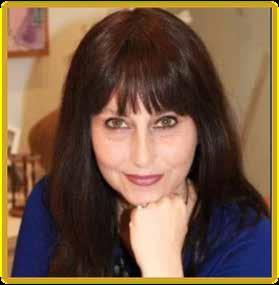
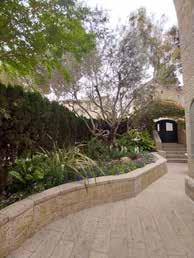
Asking





BY RABBI MOSHE TARAGIN
The struggle to settle our sacred homeland continues. Nearly eighty years after the founding of Medinat Yisrael, and despite our yearning to live in peace with our neighbors, many still deny our rightful presence in this land. The Simchat Torah war of the past year and a half is not a new chapter, but a continuation of the War of Independence—a painful reminder that our national legitimacy remains under attack and that violent antisemitism still burns fiercely.
Yet something fundamental has shifted: the ideological foundations of this conflict have changed. In 1948, opposition to our return was driven by pan-Arab nationalism—a political vision seeking to unify all Arab peoples under a single identity, both cultural and territorial. In their eyes, the emergence of a Jewish state at the heart of the Middle East was an alien intrusion, a colonial trespass upon a land they imagined exclusively theirs.
Eighty years later, our adversaries have adopted a different narrative. The fiercest resistance to Am Yisrael is no longer fueled merely by nationalism, but by religious extremism. We are no longer viewed simply as political interlopers, but as heretical invaders defiling Muslim spaces. Our presence in Yerushalayim provokes their fury, for they regard it as a desecration of what they consider exclusively theirs.
This is no longer just a territorial struggle or a contest of national ideals. What began as a clash between Arab nationalism and Socialist Zionism has evolved into a confrontation over faith, theology, and religious destiny.
For religious people this battle is more intelligible. We have returned not just to soil, but to historical mission. Our return is a stage in the unfolding of a Divine drama: the restoration of Hashem’s Shechinah to this fractured world. Our national mission—to bring Hashem’s presence into human history—is now openly challenged by those who desecrate His Name, draping hatred in false religious rhetoric and distorting emunah into cruelty. Now that the conflict has assumed religious overtones, it more seamlessly joins the long saga of Jewish history: a continual contest over the presence and meaning of Hashem in our world.
Radical Islam has grotesquely distorted the foundational truths of emunah and of the Ribbono Shel Olam. As we celebrate Shavuot and relive the moment when Hashem descended upon Har Sinai to gift us His Torah, we are summoned to reassert the truths of Torah and the principles of authentic monotheism. In a world confused by false faiths, we must clearly and courageously defend Torah against the spiritual darkness of counterfeit religion.
Avraham Avinu was the first to reveal a G-d of compassion and kindness. Before him, humanity bowed to violent forces— cruel deities who ruled with terror and delighted in human despair. Avraham introduced a revolutionary vision: a Creator who loves humanity, who desires justice and kindness, and who charges mankind with moral responsibility. To affirm this truth, the first halachot delivered at Har Sinai focused on building a just and moral society—one that protects the vulnerable and defends the downtrodden from exploitation and harm.
Likewise, one of the great pillars of halachah is pikuach nefesh—the idea that virtually every mitzvah is set aside to preserve life. Only three cardinal sins—shfichut damim, avodah zarah, and arayot—are never overridden, for they so deeply corrupt the soul that life itself becomes spiritually hollow. Every other mitzvah yields before the sanctity of life. The Torah was not given to trample life but to uplift it. When life is endangered, halachah is deferred.
This is the image of Hashem that Avraham introduced and that Matan Torah reaffirmed—a G-d of rachamim, of justice, and of deep moral concern.
By contrast, the G-d envisioned by radical Islam is a terrifying distortion. They invoke a deity of vengeance, who rejoices in bloodshed and sanctifies murder. Though they speak of one G-d, their vision is so far removed from the truth that it borders on heresy. To deny the ways of G-d is to deny G-d.
agency. Unlike other creatures, humans possess free will to build, to create, and to ascend spiritually. But that same freedom can be tragically misused. There are no evil nations condemned from birth. No human is fated to sin. Every person—Jew and non-Jew alike—possesses bechirah chofshit and bears responsibility for their choices. Judaism does not demonize the nations of the world. We do not believe in a cosmic war between forces of light and forces of darkness.
True, there was once a mitzvah to eradicate Amalek, but over time this command has faded from practical halachah. There is no eternal command to annihilate entire peoples or wage religious war.
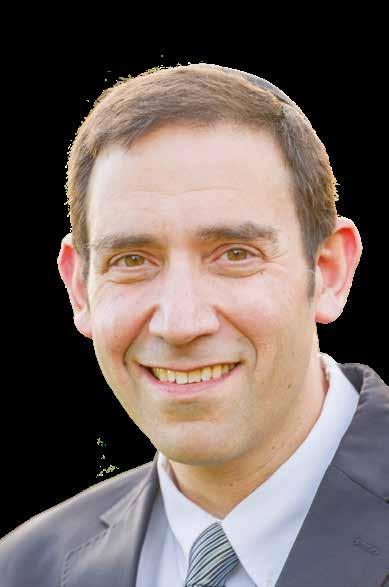
Every human life is a Divine gift. Each person is deserving of dignity, respect, and protection. There are no races or groups branded as infidels destined for annihilation. Every human being is judged individually—by choices made and paths taken.

This theological corruption has driven many people away from faith altogether. Religion, instead of being viewed as ennobling the human spirit, becomes synonymous with violence, cruelty, and death.
Every human being is created b’tzelem Elokim—in the Divine image—and endowed with dignity, choice, and moral
Judaism has no missionary impulse. We do not seek converts; we discourage them. Our vision of redemption includes a world that acknowledges Hashem, but not a world in which every person must become Jewish. Am Yisrael was chosen to live lives of kedushah, mitzvah, and covenant, to model moral nobility so that all of humanity can embrace the seven universal mitzvoth. We do not impose faith or religion through conquest or violence.
By contrast, extremist Islam often embraces coercive conversion, at times using violence to impose belief. Its roots lie in an era of conquest and military expansion, where spreading faith by the sword was tragically common.
But Hashem does not desire coerced
faith. He seeks hearts that freely choose Him. True emunah can never be forced— it must rise from within.
The Torah makes little mention of the afterlife. Even at Har Sinai, the focus was on how to live in this world. Hashem does not ask us to ignore the beauty of life or to sacrifice this world in the name of the next. A life of mitzvot and yirat Shamayim is valuable not because of what follows death, but because it reflects Hashem’s will in this world. Even if there were no Olam Haba, a life of Torah would remain the highest ideal.
Judaism deliberately avoids focusing on the afterlife. By doing so, it preserves religion’s moral center in the here and now. When the afterlife becomes an obsession—as in the case of terrorists who murder for heavenly reward—faith becomes corrupted, and any crime can easily be justified. Torah, in contrast, sanctifies life as the stage upon which Hashem’s presence is revealed.
On Shavuot we stood beneath Har Sinai and received a Torah of light, truth, and moral clarity. In an age where faith is misused and religion is desecrated, we must defend the voice of Har Sinai. On Shavuot we are challenged to protect faith from those who corrupt it.
The writer is a rabbi at the hesder Yeshivat Har Etzion/Gush, with YU ordination and an MA in English literature from CUNY. His books include the recent To Be Holy but Human: Reflections Upon My Rebbe, HaRav Yehuda Amital (Kodesh Press).

